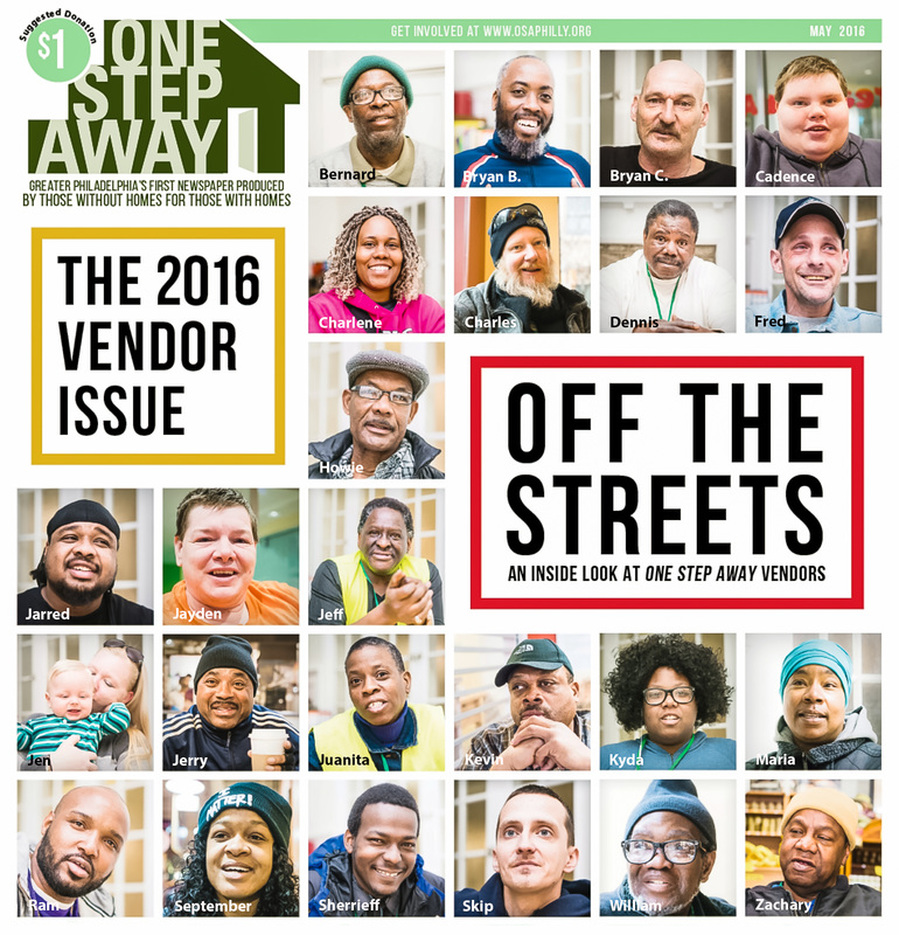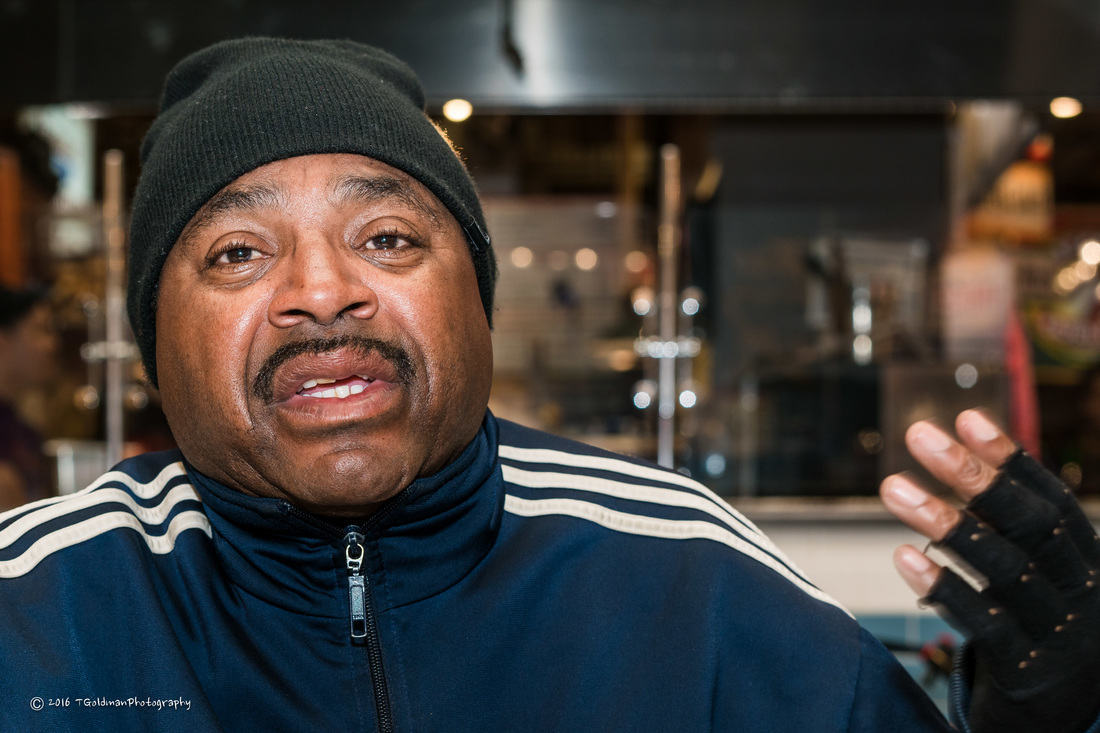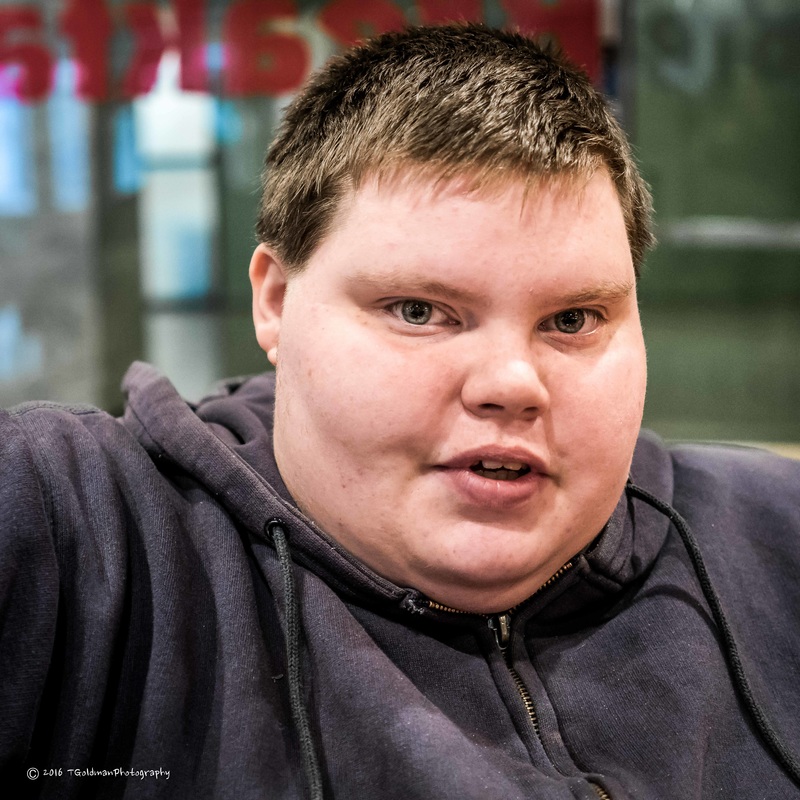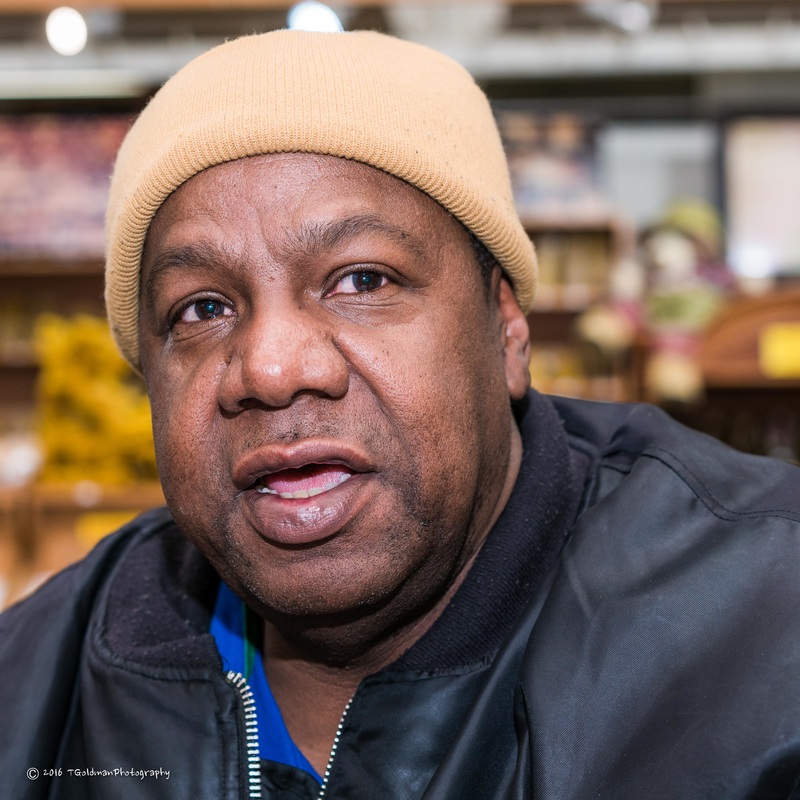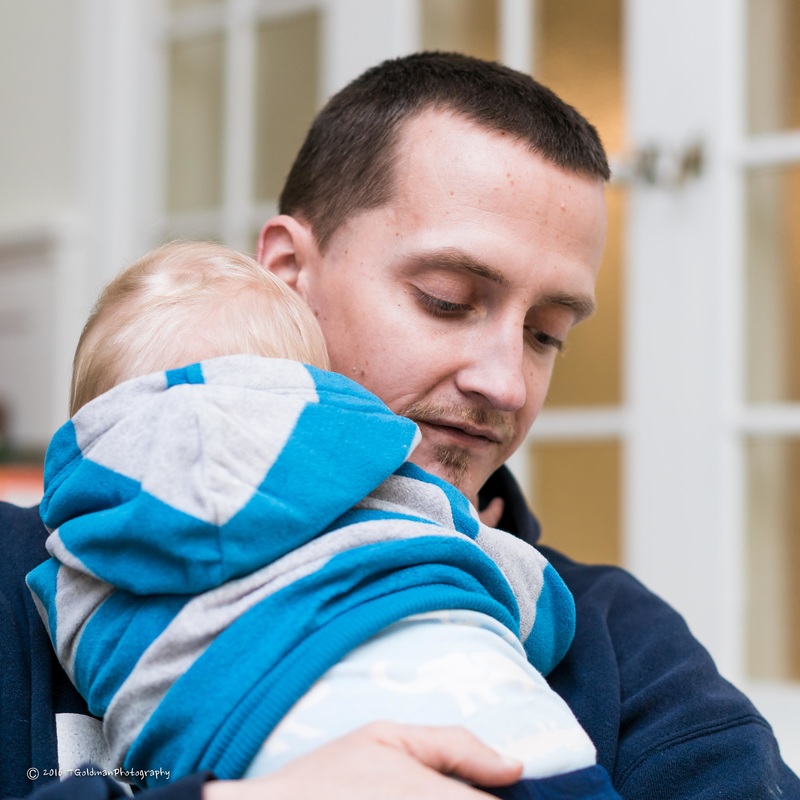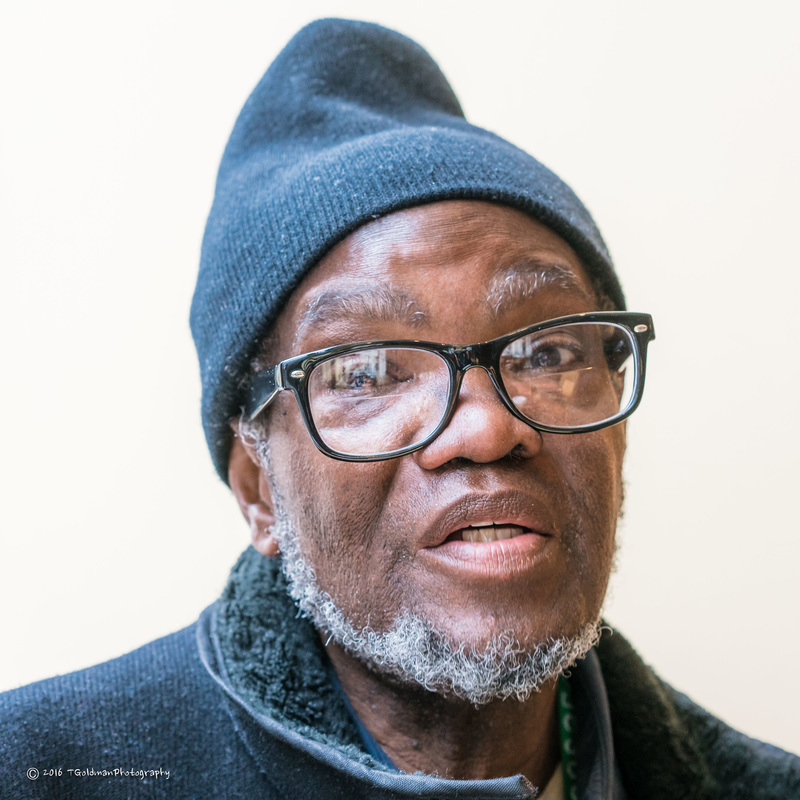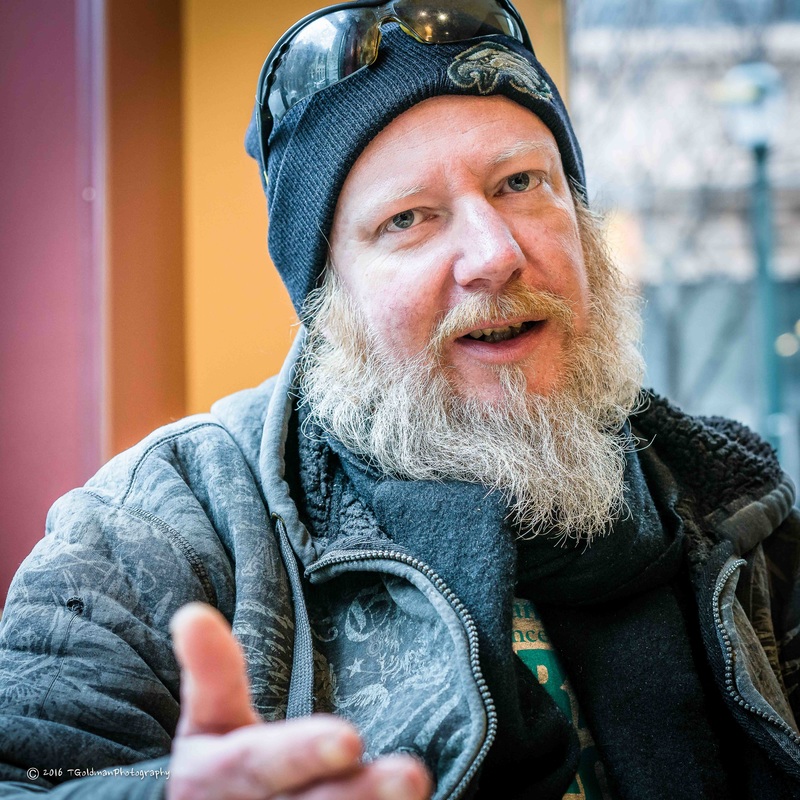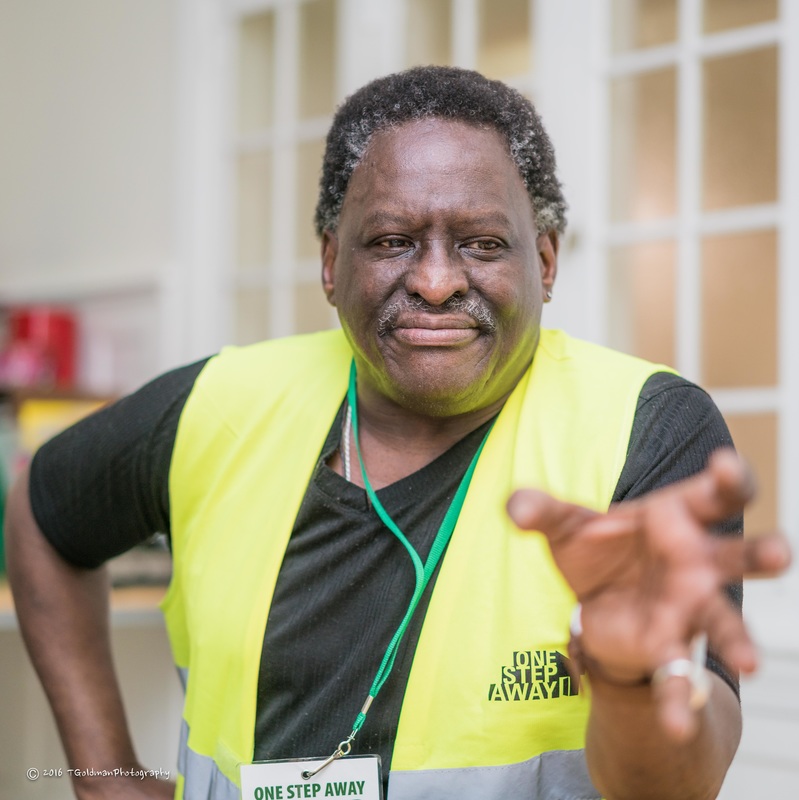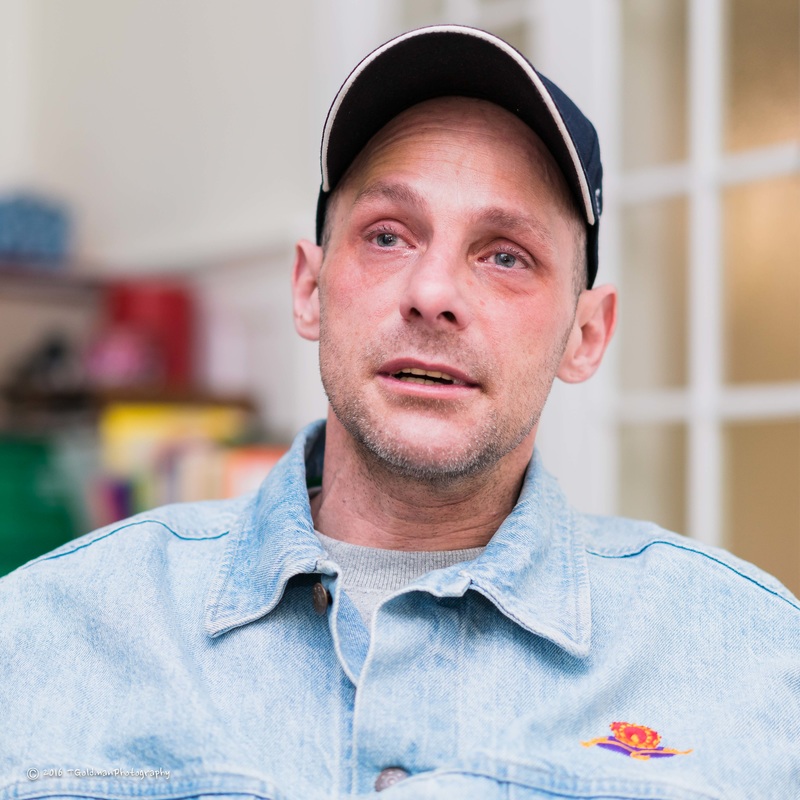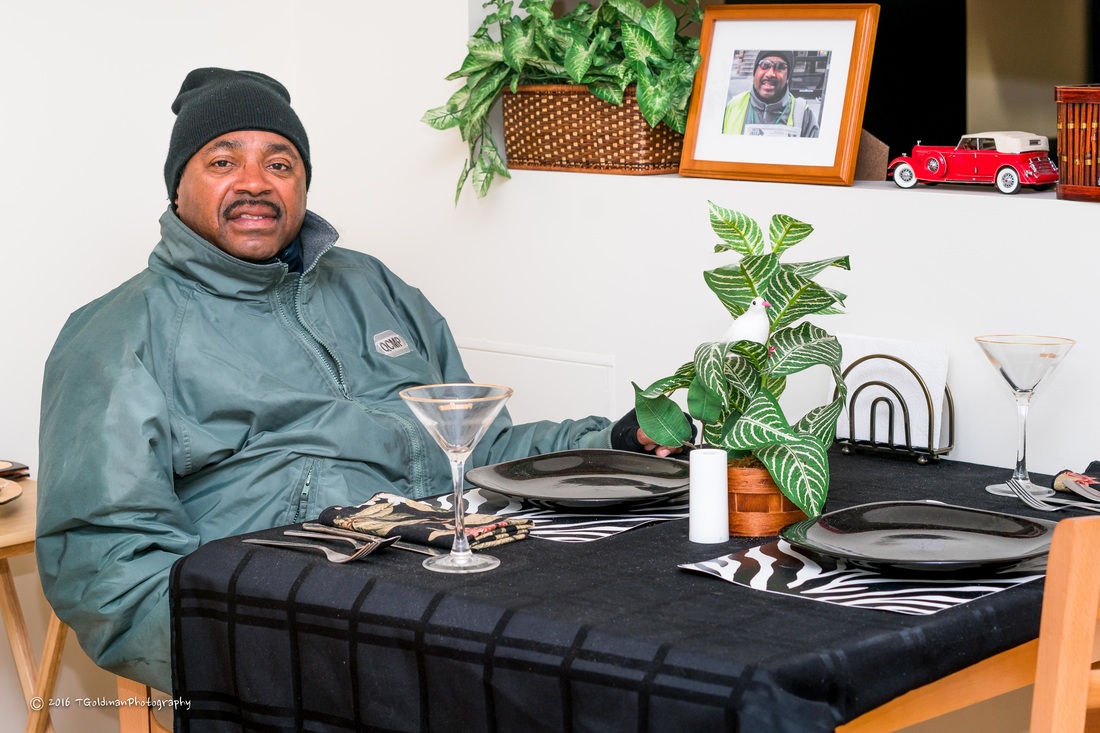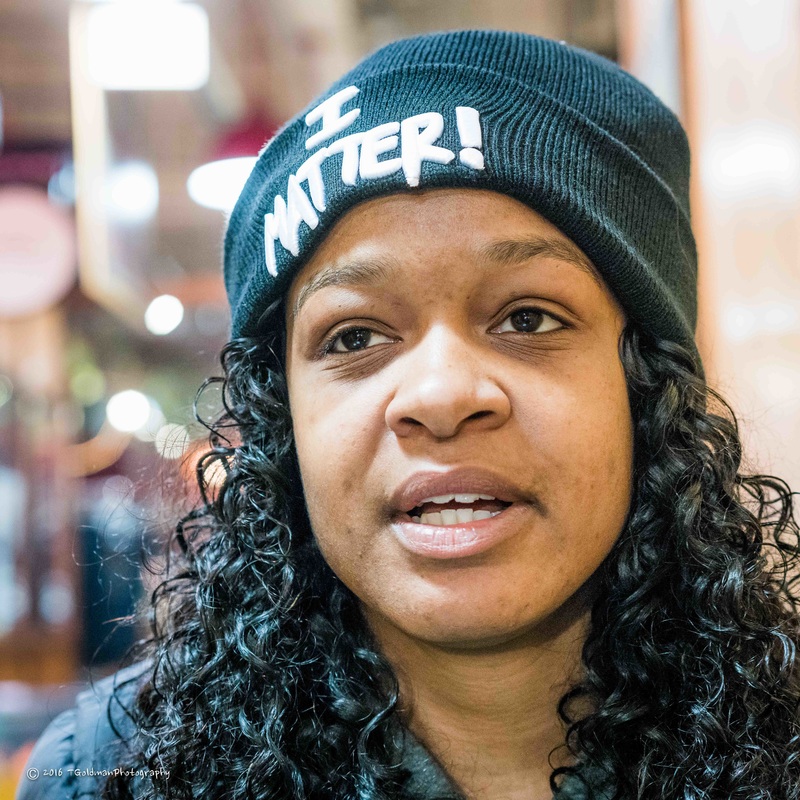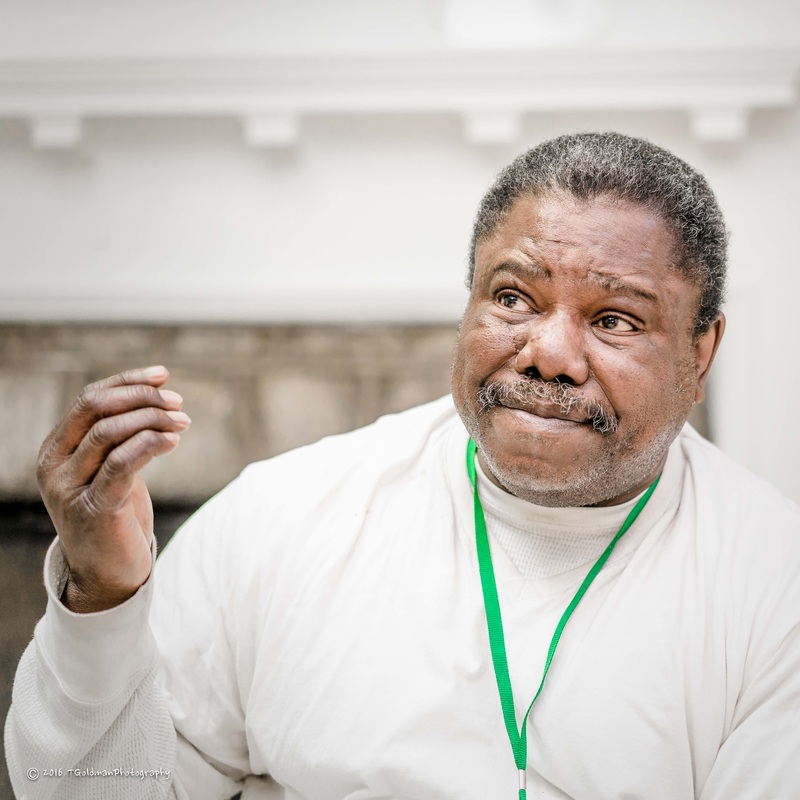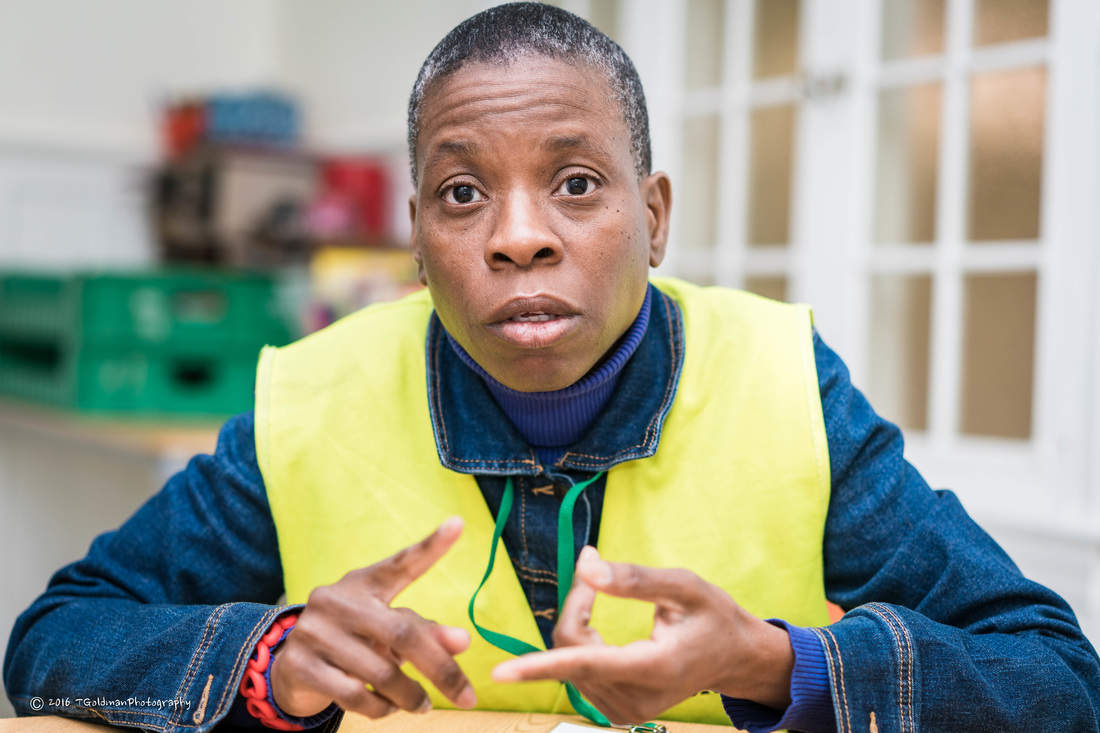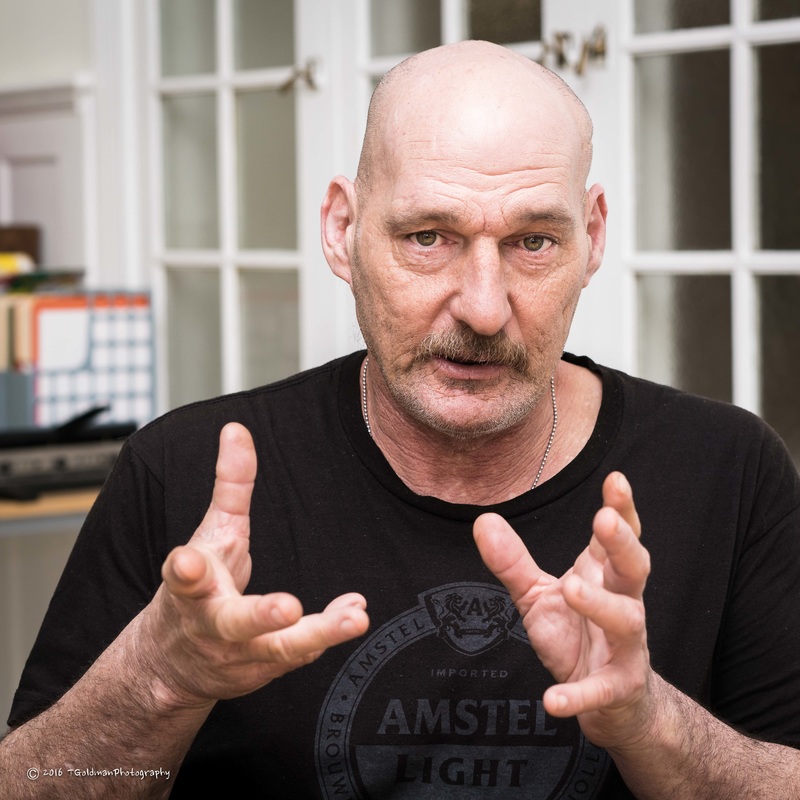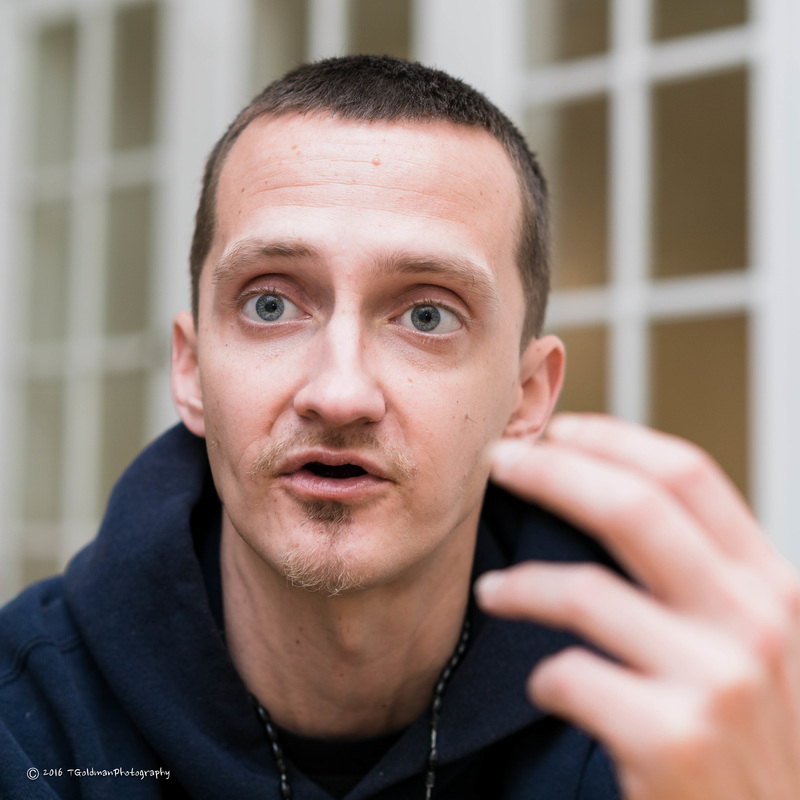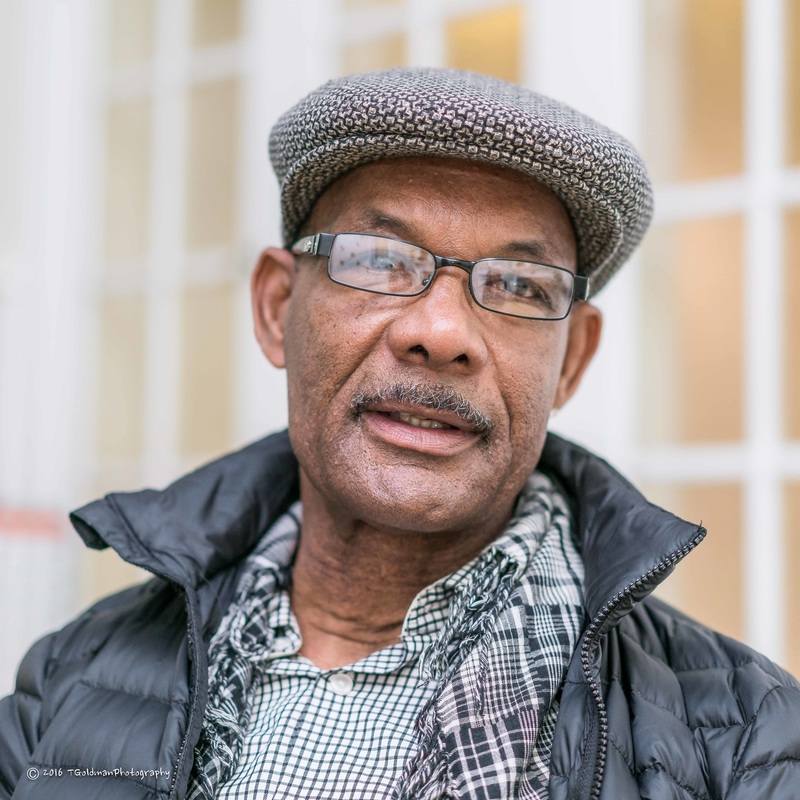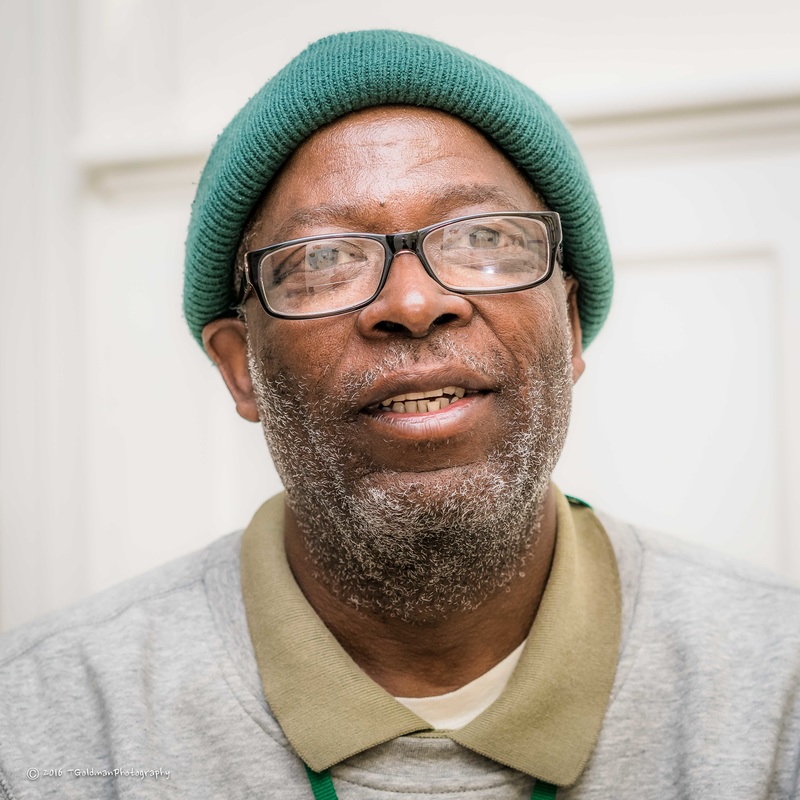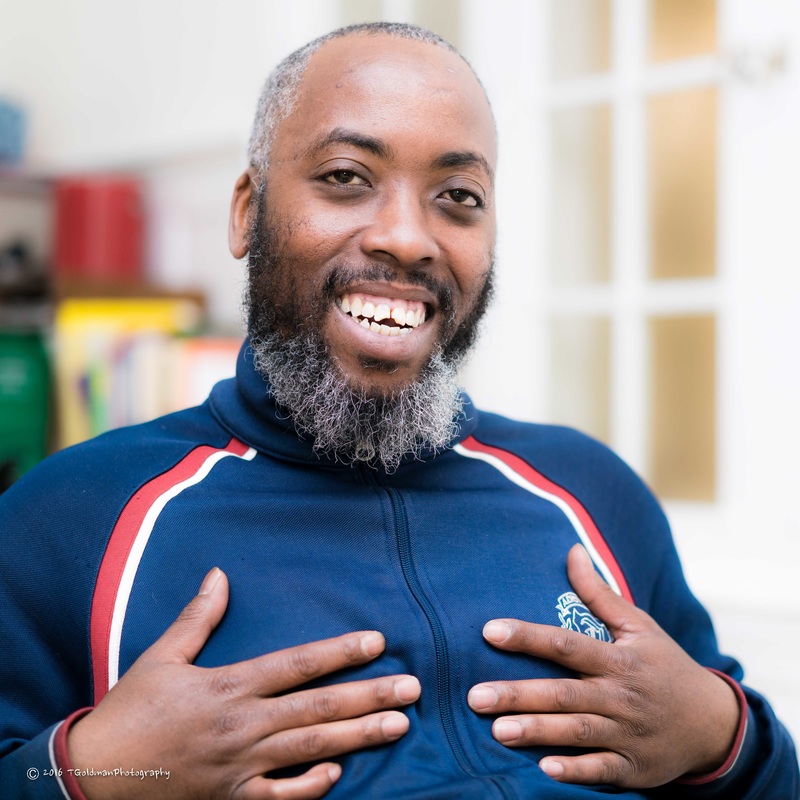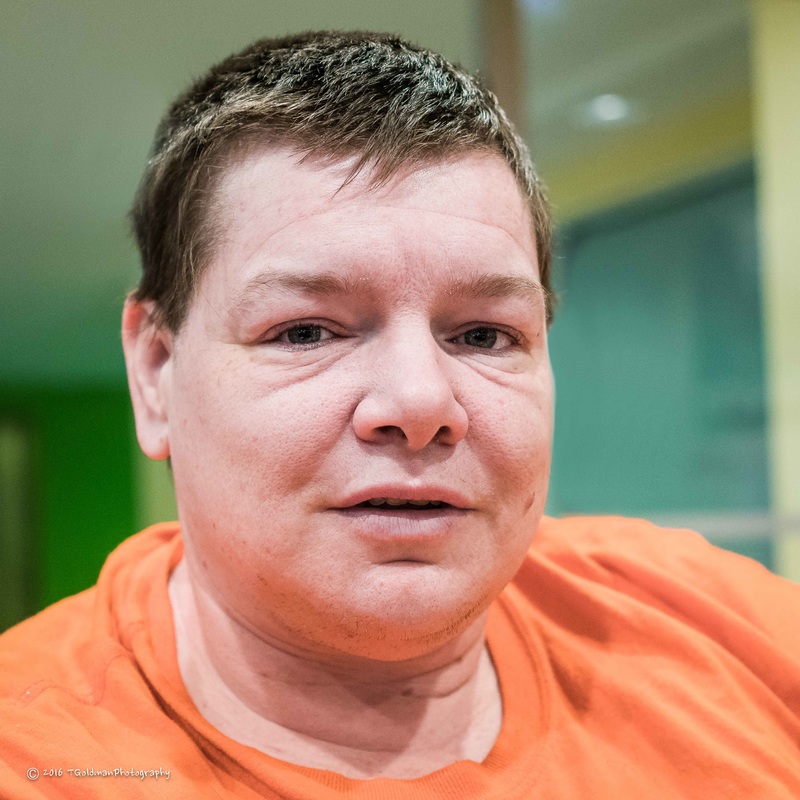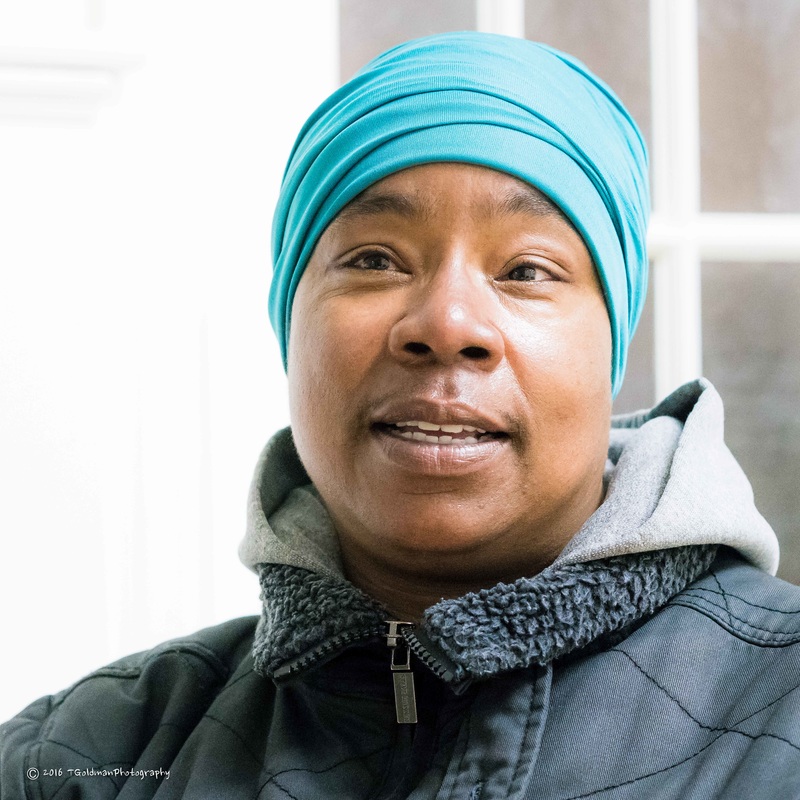Homeless Narrative
Preface
I've been involved with the homeless community since early 2015. My hope is to bring greater understanding to what is a complex and disturbing part of our society. Homeless Narrative is an in-depth photo essay about homelessness. It was written for One Step Away, the Philadelphia newspaper that seeks to overcome homelessness, joblessness, and poverty. Homeless Narrative is based on interviews with twenty four vendors who sell the newspaper. They generously gave their time and wisdom to this story. An abbreviated version of Homeless Narrative was published in May 2016, the annual vendor issue of the newspaper.
Below is the full text with comprehensive learnings about homelessness and about how we all can help. Please invest the time to read this photo essay and share it with friends and family because "homelessness is no less of a human tragedy than a hurricane or a tornado!!".... As you read the vendor's quotes, look into their faces and imagine they are speaking directly to you- because they are!
Introduction
People have a unique characteristic- they see the world though filters that might be called stories or narratives. These stories influence how people feel about situations and can influence how they act. Sometimes stories are based on fact. But often they’re based on assumptions, biases, and the unrelenting bombardment by the media, all of which can be barriers to the truth. Stories based on inaccurate information can have terrible consequences such as prejudice against a class of people.
Homelessness is particularly prone to inaccurate stories because it’s not pretty. It’s awful for those who experience homelessness, and homeless people have their own stories about how a society would allow this to happen. And those who observe homelessness can easily fall into the belief that all homeless people are lazy and riddled with drugs. Such stories don’t help end homelessness, in fact they can actually perpetuate it since one story is that homeless people aren’t worthy of being helped because they won’t help themselves. It’s easy to look down on homeless people and it’s much easier to make up a story than doing the work to get the facts.
One Step Away is the Philadelphia newspaper that raises awareness about homelessness and provides employment for people who have experienced homelessness and joblessness. One Step Away wants to change the homeless narrative in a way that could lead to productive outcomes- ultimately ending homelessness. It’s important to understand today’s narrative about homelessness as a step towards defining a more appropriate version. One Step Away vendors are in a unique position to offer insights because most have experienced the challenges of homelessness and society’s response to them, and most have experienced emerging from homelessness through employment as One Step Away vendors.
Homeless Narrative is for people who want to understand homelessness. It’s for people who don’t know what to do when they see homeless people on the street and they’re asked for money. It’s for people who want to help but don’t know how. It’s for people who care enough to take the time to learn about homelessness. And it’s for people who realize they or someone they know are only One Step Away!
We learn from the vendors that homelessness is both complex and disturbing. While the vendors agree on many aspects, they also disagree on others which is not surprising given the complexity of homelessness and because the input of vendors is based on their individual life experiences. What is most important is that the vendors put these issues on the table for people to consider.
Perhaps the most surprising and disturbing insight is that in fact many of the stereotypes are true for a portion of the homeless community- at least on the surface! But why does it happen? Homeless people were children first- no child dreams of growing up to spend their life on the street begging for money for food or drugs. We need to understand the root cause if homelessness is ever to end, and we must find a way to have compassion, not ridicule, for those who are locked into homelessness even if we don’t like the way they look or act. And we must understand that these stereotypes do not apply to all homeless people- many of whom just got a bad break and who can get back on their feet with a little help from organizations such as One Step Away.
This photo essay does not claim to provide research based conclusions about the causes and cures for homelessness, but rather it provides insights from people who have been there in hopes of starting a more productive dialog. Please read this story with a curious mind and an open heart- make this ‘one step’ in your role to end homelessness!!
What is Homelessness?
While most people might think this is a simple question, it’s not. The vendors demonstrate that homelessness can mean different things to different people. This underscores the importance of not taking complex situations and reducing them to simple stories.
----------
Jerry spent very little time living on the street but significant time in the shelter system. He described with great passion the most obvious definition that’s about not having a roof overhead or a place to go- it’s about desolation: “Homelessness is when you have nowhere to go, just out in the streets looking for a place to go, trying to get something to eat and looking for money- that's homelessness… It’s bad to be homeless- VERY bad!”
Jerry spent very little time living on the street but significant time in the shelter system. He described with great passion the most obvious definition that’s about not having a roof overhead or a place to go- it’s about desolation: “Homelessness is when you have nowhere to go, just out in the streets looking for a place to go, trying to get something to eat and looking for money- that's homelessness… It’s bad to be homeless- VERY bad!”
----------
Many vendors share the same view that homelessness is living on the street:
Other vendors think they’re still homeless even if they’re living in a shelter or living with someone else:
For others it is more of a state of mind than a place to stay:
Many vendors share the same view that homelessness is living on the street:
- William: “It’s having no place to live; for me, being in a shelter is not homeless.”
- Juanita: “No roof over your head; no shelter and no privacy.”
Other vendors think they’re still homeless even if they’re living in a shelter or living with someone else:
- Sherrieff: “Even the shelter is homeless- it’s not your stable place where you can come and go when you want.”
- Jarred: “Shelters put you out at 5am; they don’t want you to get used to it and get comfortable; they want you to get used to getting up in the morning to go to work.”
- Kyda: “Living with someone is scary- any day they could get tired of me and put me out on the street!!”
For others it is more of a state of mind than a place to stay:
- Zachary: “If I don’t have a place with my own name on it, I’m homeless.”
- Charles: “Homelessness is when you feel like an outcast- not accepted anywhere.”
- Jeff: “It’s the essence of being invisible!!”
----------
Cadence reduces the question to a very basic and poignant statement which can apply to living on the street, living in a shelter, or couch surfing (going from house to house of friends and family): “Homelessness is any time you have to live out of a bag- you have no place to hang your stuff.”
Cadence reduces the question to a very basic and poignant statement which can apply to living on the street, living in a shelter, or couch surfing (going from house to house of friends and family): “Homelessness is any time you have to live out of a bag- you have no place to hang your stuff.”
What Causes Homelessness?
There are common themes about the causes of homelessness. People experience bad breaks such as loss of job, family breakup, death of loved ones, and illness that can happen suddenly. There are also chronic problems such as addiction and mental or other long term illnesses. Convictions and incarceration have significant impact on the ability to get work. These issues often occur together which only compounds the problem. But there are also more subtle causes that might be surprising like not wanting to be a burden on others and actually preferring the street to a shelter or to adhering to other’s rules.
While many vendors have had significant challenges, they demonstrate that with the help of organizations like One Step Away and subsidized housing, it is very possible to end homelessness for many people.
---------
Zachary became homeless for a short period of time after he was evicted; today he lives in subsidized housing: “When something happens and you don’t have a ‘plan-b’ such as savings or family at close hand, you can become homeless; for me it happened when my landlord evicted all the tenants out of the blue in order to do renovations; I didn’t have a plan-b so I had no place to go!”
Zachary became homeless for a short period of time after he was evicted; today he lives in subsidized housing: “When something happens and you don’t have a ‘plan-b’ such as savings or family at close hand, you can become homeless; for me it happened when my landlord evicted all the tenants out of the blue in order to do renovations; I didn’t have a plan-b so I had no place to go!”
----------
Loss of loved ones:
Job loss:
Family breakup:
Having a record:
Mental illness:
Addiction:
Loss of loved ones:
- Jerry: “I became homeless at 16 after my mother died.”
- Fred: He became homeless after his wife died: “That’s the part that is so hard for me to get over is how quick the process is for everything to be taken from you!!”
Job loss:
- Kyda: “If you lose your source of income then you are on the street; I got laid off after I got injured at work; then I worked in fast food- I got pushed around to different jobs and I couldn't remember everything so I got fired after two weeks- they set me up for failure.”
Family breakup:
- Howie: “I had to give up my home to resolve a child support dispute and that left me homeless.”
Having a record:
- Kevin: “I suffer from mental illness which caused me to commit a crime- that makes it difficult to get a job.”
Mental illness:
- Dennis: “I had a place to live in DC with my family and I had good jobs; but in 1980 I left DC for Philadelphia where I had no job and no place to stay; it’s a mystery why I did that- my mind doesn't have the ability to know.”
Addiction:
- William: “I’ve been a compulsive gambler since I was 12 and it wrecked my life; I’ve lived on the streets multiple times sleeping in train stations or on busses and subways.”
- Jen: “I was on drugs so I couldn’t work.”
---------
Skip is very open about how addiction on top of mental problems caused his homelessness: “There were un-dealt with emotional issues like the loss of my father and my mother disowned me; I used drugs as the answer to my problems but it just made things worse; I worked just to support my drug habit but I couldn't keep a roof over my head.... I have to get rid of it because I realize that if I don’t get off drugs I won’t be able to live; I always had it in the back of my mind that I could smoke weed and take my medicine- I could justify that, but it never worked.... This is the first time I’ve lost all desire to get high- I’ve been clean for 5 months.... People say I can’t do it for anyone else- I first have to get me right before I can be there for others; I’m done- I’m never going back because I have a family and I won’t put them at risk.”.... Skip is in a recovery program and expects to move into a place with his son Christian and his son's mom Jen (also a vendor) very soon.
Skip is very open about how addiction on top of mental problems caused his homelessness: “There were un-dealt with emotional issues like the loss of my father and my mother disowned me; I used drugs as the answer to my problems but it just made things worse; I worked just to support my drug habit but I couldn't keep a roof over my head.... I have to get rid of it because I realize that if I don’t get off drugs I won’t be able to live; I always had it in the back of my mind that I could smoke weed and take my medicine- I could justify that, but it never worked.... This is the first time I’ve lost all desire to get high- I’ve been clean for 5 months.... People say I can’t do it for anyone else- I first have to get me right before I can be there for others; I’m done- I’m never going back because I have a family and I won’t put them at risk.”.... Skip is in a recovery program and expects to move into a place with his son Christian and his son's mom Jen (also a vendor) very soon.
How Many Types of Homeless People Are There?
It’s very common to treat groups of people as if everyone is the same- having the same issues, thoughts and needs. This is very prevalent for race, nationality, gender, political affiliation and just about any other group that comes to mind. Homeless people are commonly lumped into a single category as well and it often sounds like lazy and addicted. All of the vendors agree that there are many segments within the homeless community, and that each needs a different kind of support. One vendor analyzed this segmentation in detail.
----------
Kevin defined seven groups of homeless people- “Each has different problems and needs; making a judgement about a person on the street without first speaking with them does a great disservice.” Whatever the cause, people can get stuck unless there is help to change their lives and they have the will to accept it.
Kevin defined seven groups of homeless people- “Each has different problems and needs; making a judgement about a person on the street without first speaking with them does a great disservice.” Whatever the cause, people can get stuck unless there is help to change their lives and they have the will to accept it.
- Mentally ill- in the worst case only capable to eat three meals a day and take medication- if they remember.
- Working class- working but homeless.
- Criminal Record- want to work but can’t get jobs; One Step Away offers a tremendous opportunity to people who have paid their debt to society.
- Veteran- returning home with injuries or mental illness.
- Lazy- don’t want to do anything for themselves- but this may be caused by the trauma of homelessness.
- Addicted- often panhandling to get money for drugs.
- Old or sick- unable work.
----------
Zachary describes the remarkable concept that some people can actually get comfortable with homelessness and have little interest in changing: “They get into a lifestyle of being homeless; they get caught up into that world; they get used to going to shelters, soup kitchens, and getting hand outs- this is the group that doesn't want to do anything for themselves and may not need to because there is always food, clothes and money available.”
Taking this a step further, there are homeless people who actually want to be homeless- and that’s very troubling because it feeds the worst stereotype of homelessness!
Zachary describes the remarkable concept that some people can actually get comfortable with homelessness and have little interest in changing: “They get into a lifestyle of being homeless; they get caught up into that world; they get used to going to shelters, soup kitchens, and getting hand outs- this is the group that doesn't want to do anything for themselves and may not need to because there is always food, clothes and money available.”
Taking this a step further, there are homeless people who actually want to be homeless- and that’s very troubling because it feeds the worst stereotype of homelessness!
----------
Jarred knows the homeless community very well because he spent years living on the street. He is very clear that a lot of people want to be homeless: “There are people who just want to get high; they use all the money they get to buy drugs; and then there are people who aren’t addicts but they just don’t want to pay rent- they might be making money and don’t even notice they’re homeless; if a person is doing what they want, I feel happy for them; if they want to be homeless that’s great- they have what they want.”
But there is an ominous side as well: “It used to be easy to sleep in Philadelphia’s train stations and plazas, but these places are getting locked up; over the next few winters there’s going to be a lot of hypothermia, so more people will be looking for places to stay.”
Jarred knows the homeless community very well because he spent years living on the street. He is very clear that a lot of people want to be homeless: “There are people who just want to get high; they use all the money they get to buy drugs; and then there are people who aren’t addicts but they just don’t want to pay rent- they might be making money and don’t even notice they’re homeless; if a person is doing what they want, I feel happy for them; if they want to be homeless that’s great- they have what they want.”
But there is an ominous side as well: “It used to be easy to sleep in Philadelphia’s train stations and plazas, but these places are getting locked up; over the next few winters there’s going to be a lot of hypothermia, so more people will be looking for places to stay.”
----------
Ram provides insight about people who have given up on themselves: “The reality is that the majority of homeless people in Philadelphia are black; there is so much racism going on!.... I’ve done a lot of research: In the 60’s, 80% of families had both parents- but today it’s a single parent house or no parents; if there is a parent, it’s the mother; children need both male and female role models; black men used to be able to get jobs even if they didn’t have an education- they could take care of their families; but over time, the jobs got taken away- then what happens; these men get exposed to drugs and families get destroyed; not only have I studied this, but this is who I am!!… This is how it is for people of color; the fathers are gone and the cycle repeats for their families, mostly for sons."
"Children need to be fed emotionally and spiritually- if they don’t get that in the family, they look for it on the street which results in depression, drugs, and crime.... Homeless people get so accustomed to living on the street that it becomes their life; and many people would rather live that way than deal with the stress of a job and keeping an apartment or a house; they can always get food and money.... Some of the people on the street aren’t there; they’re just the physical shell of a body- their spirits are gone; that’s not laziness- it’s emptiness!!”
Note: In all fairness, any child regardless of race who does not get fed emotionally and spiritually may become an at risk adult.
Ram provides insight about people who have given up on themselves: “The reality is that the majority of homeless people in Philadelphia are black; there is so much racism going on!.... I’ve done a lot of research: In the 60’s, 80% of families had both parents- but today it’s a single parent house or no parents; if there is a parent, it’s the mother; children need both male and female role models; black men used to be able to get jobs even if they didn’t have an education- they could take care of their families; but over time, the jobs got taken away- then what happens; these men get exposed to drugs and families get destroyed; not only have I studied this, but this is who I am!!… This is how it is for people of color; the fathers are gone and the cycle repeats for their families, mostly for sons."
"Children need to be fed emotionally and spiritually- if they don’t get that in the family, they look for it on the street which results in depression, drugs, and crime.... Homeless people get so accustomed to living on the street that it becomes their life; and many people would rather live that way than deal with the stress of a job and keeping an apartment or a house; they can always get food and money.... Some of the people on the street aren’t there; they’re just the physical shell of a body- their spirits are gone; that’s not laziness- it’s emptiness!!”
Note: In all fairness, any child regardless of race who does not get fed emotionally and spiritually may become an at risk adult.
----------
It’s so easy to fall into the homeless stereotype, even by people who have been homeless. It’s important to realize that homelessness, regardless of the cause, can become a deep pit. It takes huge strength for people to climb out rather than just staying where they are and leaning on drugs for comfort:
It’s so easy to fall into the homeless stereotype, even by people who have been homeless. It’s important to realize that homelessness, regardless of the cause, can become a deep pit. It takes huge strength for people to climb out rather than just staying where they are and leaning on drugs for comfort:
- Fred: “Once people get used to being homeless, if they don’t get out of the grips of homelessness and don’t have the mentality about being self-sufficient, they loose all focus about being part of civilization.”
- Charlene: “Some homeless people can get so sapped of energy that they’re no longer aware of what strength they have; how they use that strength is up to them; if they lean more towards their weaknesses it’s just going to take them deeper into depression and hating themselves vs. having that little piece of strength to ask someone for help- that takes a lot of courage knowing that most people will ignore them!”
How Did People Treat You When You Were Homeless?
This raises another question: how does one know if a person ‘is’ homeless? This is an example of the basic premise of the Homeless Narrative that making up stories about people in absence of facts can lead to the wrong conclusions. The stereotype of a homeless person is about the way they’re dressed and about their behavior. As the vendors point out, this can be misleading because it’s not always obvious who is homeless. The general view is that if a person is assumed to be homeless, they will often be looked down upon. But that too is an over generalization because there are many people who are caring and compassionate.
----------
William had to convince people that he was in fact homeless.“People don’t know that you’re homeless unless you’re dirty and smelly; I was treated OK because I didn't look homeless.... I was at 30th street station and someone had pizza for homeless people; I said I was homeless and they said- ‘no you’re not homeless’; it’s because of the way I was dressed.”
William had to convince people that he was in fact homeless.“People don’t know that you’re homeless unless you’re dirty and smelly; I was treated OK because I didn't look homeless.... I was at 30th street station and someone had pizza for homeless people; I said I was homeless and they said- ‘no you’re not homeless’; it’s because of the way I was dressed.”
----------
When people are aware that a person is homeless, the treatment can be humiliating:
When people are aware that a person is homeless, the treatment can be humiliating:
- Jerry: “At a shelter my bed had dirty sheets so I asked about it and they said- ‘did you have sheets where you came from?’.... That’s the way they talk to you- it’s wrong; some people would rather be on the street because they think the street is better.”
- Brian B.: “Some staff at the shelter treat you well and some look down on you because you’re in that situation; they put a ‘foot’ on you- ‘you’re stuck here and will do what I say’; some make you feel like you’re third class and it takes away your motivation.... But some staff will help and motivate you- they might even give you a TransPass to help you get to work.”
- Charles: “They pass judgment on you; once at a coffee shop someone said to watch out for that homeless guy because he might steal from you, but I wasn't homeless and I wasn't going to steal from anyone.... I say find out the facts before you judge!!”
- Maria: It can be hard to shed the stigma: “I’m no longer homeless but I live and sell papers in the same area; people still remember and treat me badly; people can be so cruel to homeless people- it’s leverage to build themselves up.”
- Jen: “It depends on how you come off- if you’re homeless and look like a mess, you'll get treated worse.”
But it’s wrong to assume that everyone treats homeless people poorly:
- Dennis: “Some people are compassionate; one person put a $10 bill under my blanket.”
- Brian C.: “I lived in Fairmount Park in a tent; the police knew what I was doing and they would check on me and bring me cases of water- there are some good people out there!”
- Sherrieff: “The staff treated me OK in the shelter- some of them live in the shelter as well so they understand.”
How Does It Feel To Be Homeless?
Homelessness for most people, whatever their specific definition, is a degrading experience that saps them of their self worth. Homelessness typically follows some type of loss and it’s just another terrible blow to a person’s self esteem. This can become a barrier to taking advantage of opportunities to get back on their feet- that’s not laziness! But as the vendor's comments reveal, every question can be seen in so many different ways.
----------
Charles felt like less of a person. “It’s very humbling; I had to depend on other people; I used to come into the city for shows when I had money, so it was weird to be in the same area with a different perspective; It was like the Patrick Swayze movie ‘Ghost’- I felt transparent- people just walked by me like I wasn't there.... Homelessness is a feeling like being an outcast- not accepted anywhere!”
Charles felt like less of a person. “It’s very humbling; I had to depend on other people; I used to come into the city for shows when I had money, so it was weird to be in the same area with a different perspective; It was like the Patrick Swayze movie ‘Ghost’- I felt transparent- people just walked by me like I wasn't there.... Homelessness is a feeling like being an outcast- not accepted anywhere!”
----------
Many vendors share the feeling that homelessness is demeaning.
Many vendors share the feeling that homelessness is demeaning.
- Cadence: “People ignored me like I was invisible; it got to the point that I felt like I WAS invisible!!”
- September: “It feels like you aren’t in control of your life, whether it’s in a shelter or living with someone; I don’t have the issue with feeling transparent- I make sure people see me!”
- William: “Oh man, it’s horrible!!!; you can’t lay in a bed; at 30th street station you have to lay on benches or on the floor.”
- Kyda: “It is horrific- hard to bear; living in a shelter is awful; it’s dirty and people steal your stuff- they will steal your shoes and even your underwear and socks!!”
- Skip: “People treated me bad; they would look down on me and had an attitude about me; that made me feel horrible and made me have a attitude back at them!”
- Howie: “I felt like Job (Book of Job in the Bible)- I had a prosperous business and it gave me comfort that you feel you can’t fall from; God loved Job and then he fell and had nothing- it’s like a fall from grace; that’s what happened to me; but I said to myself- ‘I had a good life before, I can get there again!’”
----------
Jeff added a different and perhaps even more painful perspective about the feeling of being invisible- “homeless people WANT to be invisible out of fear!.... At a certain time of the day people are going home and you aren’t; you’re looking for a place to sleep so you can survive; you never sleep- you’re never comfortable; you’re always on edge in some way; you don’t want to be exposed; you don’t want a lot of contact with the public- you want to be invisible; if you see someone coming towards you, your guard goes up- does this person mean me harm; once people find out that you’re weak, their dark side will hurt you- you become frightened of other humans!!!!.... At the same time, if a homeless person looks and behaves scary, the people who might show compassion will turn away out of fear.”
Jeff added a different and perhaps even more painful perspective about the feeling of being invisible- “homeless people WANT to be invisible out of fear!.... At a certain time of the day people are going home and you aren’t; you’re looking for a place to sleep so you can survive; you never sleep- you’re never comfortable; you’re always on edge in some way; you don’t want to be exposed; you don’t want a lot of contact with the public- you want to be invisible; if you see someone coming towards you, your guard goes up- does this person mean me harm; once people find out that you’re weak, their dark side will hurt you- you become frightened of other humans!!!!.... At the same time, if a homeless person looks and behaves scary, the people who might show compassion will turn away out of fear.”
---------
There are other views about a homeless person’s defense mechanism:
There are other views about a homeless person’s defense mechanism:
- Howie: “For some homeless people, being dirty and smelling bad can be their defense; if you are that way, people won’t rob or attack you- it’s like a skunk alarm!!”
- Ram: He sees it differently: “When people become stagnant, they lose the ability to take care of themselves- they don’t even know how to stay clean!”
---------
Fred wells up with emotion as he talks about the death of his wife and the struggles of his daily homeless life- it’s heartbreaking! He describes homelessness as being highly regimented and much more than a full time job: “I can’t do the things that most people can do without giving it a second thought- it’s like I have a ball and chain around my ankle.... I can’t just get up in the morning and take a shower- I have to sign up the day before; I can’t just go to the store to buy a pair of sneakers or do my wash or get something to eat- to do those things I have to sell so many papers and to do that I have to get my papers at the designated time and then have enough caring people who say they want to support this guy.... Being homeless is a full time management position- you’re constantly on the go in order to survive!!!”
Fred wells up with emotion as he talks about the death of his wife and the struggles of his daily homeless life- it’s heartbreaking! He describes homelessness as being highly regimented and much more than a full time job: “I can’t do the things that most people can do without giving it a second thought- it’s like I have a ball and chain around my ankle.... I can’t just get up in the morning and take a shower- I have to sign up the day before; I can’t just go to the store to buy a pair of sneakers or do my wash or get something to eat- to do those things I have to sell so many papers and to do that I have to get my papers at the designated time and then have enough caring people who say they want to support this guy.... Being homeless is a full time management position- you’re constantly on the go in order to survive!!!”
---------
For some, homelessness can be a motivator:
But one vendor asks us not to make assumptions about how someone feels- again, don't make up stories:
For some, homelessness can be a motivator:
- Brian B.: “It made me work harder to get better- I stayed focused; I took advantage of the warm bed at the shelter so I could save money to move on; anyone can stumble but you can’t give up!”
But one vendor asks us not to make assumptions about how someone feels- again, don't make up stories:
- Kevin: “Don’t assume homeless people are sad- they aren't sad; people who lose everything feel sad; homeless people haven't lost everything- they had a childhood, a birth, had parents- even if they didn’t know their father, they knew they had a father because they were born!!!; don’t assume that homeless people are sad just because you wake up in your own bed and they don’t!!”
If You Have A Home Today, How Does It Feel?
In most cases the vendors say that having a home is a big improvement because their basic human needs are being met, in stark contrast to the inhumanity of the streets and many shelters. But it’s wrong to assume that everything becomes great once homeless people have a roof over their heads. Some situations can be bad and possibly unsafe. Some vendors believe that their real accomplishment is in the future.
- Juanita: “There’s no place like home- you can rest your head under your own roof!
- Jarred: “It feels good; I have a girl friend and she can come over any time; I have my own key and I don’t get kicked out at 4 am and have to rush back at 6 pm like in the shelter.”
- Cadence: “My favorite thing is that I can take a shower any time I want; when I lived on the street I wouldn’t be able to take a shower for weeks and I felt disgusting; now I can watch TV or play a video game whenever I want.”
- Jeff: “When I first moved into my place I had no furniture so I slept on the floor, but it felt pretty darn good to have my own roof over my head and keys in my pocket- it feels wonderful!!”
- Maria: “I’m happy to have a roof over my head, but it’s not a good situation for me- I don’t feel safe.”
- Jen: “I wouldn't choose to be where I am, but it’s safe and warm till I can get a place of my own; if I were on the street they would take my baby, so I’m real happy to be there!”
- Charles: “It really doesn't feel like an accomplishment; that will come when I get a full time job- I hope it will happen someday.
- Jayden: “It’s not a big deal because I knew I was going to get there, but I work hard to keep it because I did it myself- no one got me to this point; I’m very proud that I pay the rent and phone bill, and I never begged for anything.”
---------
Jerry has a lot to be proud of: his children, grandchildren and his wonderful apartment which is immaculate- his table is always ready for a fine meal!! The photo over the table shows Jerry in his role as a One Step Away vendor- another big source of pride! “It’s great to have your own place- it makes you feel so much better!”
Jerry has a lot to be proud of: his children, grandchildren and his wonderful apartment which is immaculate- his table is always ready for a fine meal!! The photo over the table shows Jerry in his role as a One Step Away vendor- another big source of pride! “It’s great to have your own place- it makes you feel so much better!”
Now That You Are Self-Sufficient, How Do You Treat Homeless People?
The most important outcome for anyone reading this photo essay is to decide how homeless people should be treated. A very provocative question for the vendors is how they treat homeless people now that they have income and most are in homes they can call their own. Their responses include being non-judgmental because they remember their experiences, providing whatever help they can, not reinforcing bad behavior, and setting personal limits on what help they offer. But most vendors have gotten where they are by taking responsibility and working with the help of One Step Away. Most don’t respond well to people who won’t do anything for themselves or who mislead people by asking for money that will often go for alcohol or drugs.
----------
September’s life experience changed the way she thinks about people: “I used to look down on people before things went bad for me- I was very judgmental and stereotyped everyone; I would put people in groups; God decided to put me into one of those groups so I could see what it feels like; God put me through these challenges to change me; I don’t judge anymore!”.... And yes, as her hat says- she does matter!!
September’s life experience changed the way she thinks about people: “I used to look down on people before things went bad for me- I was very judgmental and stereotyped everyone; I would put people in groups; God decided to put me into one of those groups so I could see what it feels like; God put me through these challenges to change me; I don’t judge anymore!”.... And yes, as her hat says- she does matter!!
----------
- Jerry: “I ask if they want something to eat and take them for a meal; when I sell papers, people give me things like blankets and food- I give them to homeless people because I’m more fortunate than they are; I put at least seven people into One Step Away; I got my blessings and now I want to help others.”
- Howie: “I try to have love for everybody; I give homeless people fruit- you can make all these sandwiches but people don’t realize that homeless people want fruit which no one ever gives them!”
- Zachary: “I try to be nonjudgmental- I don’t look down on them; if I can help them, I help and I tell them where they can get work and a meal; for people that are dysfunctional like with mental illness- I don’t know what to say, I don’t have words, I just shake my head; giving money is not going to help.”
- Cadence: “I get annoyed with many of them; I have social anxiety and I got over it to sell One Step Away papers; I see panhandlers that I told about the papers and they’re still panhandling; I wish I was more compassionate but I don’t have sympathy for people who won’t help themselves.”
- Juanita: “I always treat them like human beings.” Long before she went into a shelter, she and her son made sandwiches for homeless people- clearly she has a generous heart!
- Kevin: “I never look down on homeless people; I socialize with them- we talk about sports and the last movie they saw; I find out about them.”
- Jeff: “There is an understanding that I didn't go through this situation and come out of it having learned nothing about other people; I treat people with and without homes with respect and love; I can see beyond my own altruism- I went through this to learn something; when I see a person who is approachable, I get beyond the barrier; I don’t recommend homelessness, but I learned from it!!”
----------
Kyda is homeless today. She does what she can for homeless people but she also has a strong message: “I try to help people by giving extra food and change if I have it, but I’m homeless as well; I’m not obligated to help them if they won’t help themselves; you have to help yourself before someone can help you; you have to love yourself before someone can love you; if you’re not trying to do anything then you need to be where you are!.... I can’t help everyone- I can’t!!”
Kyda is homeless today. She does what she can for homeless people but she also has a strong message: “I try to help people by giving extra food and change if I have it, but I’m homeless as well; I’m not obligated to help them if they won’t help themselves; you have to help yourself before someone can help you; you have to love yourself before someone can love you; if you’re not trying to do anything then you need to be where you are!.... I can’t help everyone- I can’t!!”
----------
Dennis sets limits on what he can give to homeless people: “My heart goes out to them; sometimes I give them money and sometimes I don’t; it’s not that I can’t but you have to set your limits and boundaries.”.... He ended with a verse that says it all:
Dennis sets limits on what he can give to homeless people: “My heart goes out to them; sometimes I give them money and sometimes I don’t; it’s not that I can’t but you have to set your limits and boundaries.”.... He ended with a verse that says it all:
- Sometimes you do - Sometimes you don’t;
- Sometime you will - Sometime you won’t!!
How Should Homeless People Be Treated?
Anyone spending time in Philadelphia or any big city will face homelessness. People portraying the stereotype will be found almost everywhere. They approach passersby asking for money for food. Many are meagerly dressed and often don’t look well. Some will stand or sit on the ground with a cup or holding a cardboard sign asking for money. Some have children or dogs. Some are passive and some are aggressive panhandlers. The agony of this image is heightened in winter when homeless people are shivering in clothes not suited for the environment.
If the average passerby would see just one or two homeless people, it might be different. But there’s a flood of panhandlers at most corners, bus stops, and train stations. What is the average passerby to do? And it could be risky- “It takes a lot of guts to approach a homeless person- you don’t know their mental status.” (Bernard)
If people give to one homeless person, what about the next? Does the donation really help? It’s not that people don’t care, but most passersby just tune it out for their own piece of mind, pretending that these unfortunate souls don’t exist or perhaps denying that they too are One Step Away- hence the feeling in the homeless community of being transparent. Each side of this unfortunate relationship distrusts the other. This is a no-win situation for everyone.
Vendors understand this from all sides. They have their own views, and their personal challenge continues because in selling One Step Away papers they will often be lumped into the same story. Most vendors share the view that giving money to panhandlers will not help. For those who are truly in need of food and shelter, services are readily available in Philadelphia and in most major cities. The concern about giving money is that there is a strong likelihood it will be used for drugs- though that too is a story because there is no way to know unless you get to know the person.
The vendor’s range of comments show the complexity of this very important question.
----------
Juanita doesn't mince words when it comes to treatment of homeless people: “It’s very simple- you treat them like human beings!... Remember, they’re someone's mother or father; aunt or uncle; son or daughter; brother or sister- they just don’t have a roof over their heads!”
Juanita doesn't mince words when it comes to treatment of homeless people: “It’s very simple- you treat them like human beings!... Remember, they’re someone's mother or father; aunt or uncle; son or daughter; brother or sister- they just don’t have a roof over their heads!”
----------
- Jerry: “I feel bad for them; but what gets me are homeless people with signs; I say go to One Step Away, but they don’t want to; the one’s digging in trashcans are looking for something to eat, but the one’s with signs want money for drugs.”
- Charles: He writes a Q&A column for One Step Away: “A common question asked is how you should deal with people on the street asking for money; my answer is that a lot of time you’re wasting your money because those people are supporting an addiction; giving them money and enabling their lifestyle isn’t going to help… Sometimes you get to the point that if that’s the way they want to lead their life, there’s nothing you can do.... But if drug addicted or mentally ill, that’s a difficult problem.”
- Zachary: “I never resorted to panhandling or begging- I could always find a place to eat; there is food, clothing, money and shelter available; some people want their cake and eat it to- they want the services that are available and they want money.”
- Dennis: “It’s better to make donations to charitable organizations- that’s the best way to help the homeless.”
- Brian C. “A word of encouragement would help; but I don’t like to give money.... There was a guy who was bumming change and a lady bought him a sandwich- he took the sandwich and threw it on the ground- he could have given it to someone; he just wanted the money so he could drink beer- he didn't want the food; that made me angry; giving money can make things worse.”
- Kyda: “Follow the Golden Rule- treat people the way you want to be treated; people walk by homeless people because of ignorance- they don’t want to be aware that this person is homeless; why not stop and take the time; my attitude about giving money is that I would rather give them food; I’ve seen them buy cigarettes and beer, not food, so I refuse to give money; if you don’t want the food, you’re not homeless!!!”
- Jarred: “The ones that want to be homeless don’t need help; for the one’s that want help, tell them to call the Outreach Hotline (Project HOME’s Outreach Coordination Center).”
- Jen: “If you look like you are on drugs, no one is going to help you!”
- Jayden: “Acknowledging people is enough; in Philly there are so many resources, so if people stop giving money, homeless people would be more receptive to going after those resources; so as harsh as it sounds, that’s what has to happen; people who want to help should get some information about resources to offer to homeless people about where they can go to eat or get shelter”
Fred took a public stand on the issue of giving homeless people money: “I’m out every day working my butt off to sell papers and look for a job; I was on the EL and there’s the same guy always asking people for change saying he’s homeless and wants something to eat; when this guy got done I stood up and said 'I’m homeless and I sell papers every day to take care of myself, so if you keep giving these people money they won’t do anything for themselves and they will keep coming back for more'; some people clapped and some just shook their heads… The people who try to milk the system become the stereotype and guys like me get pulled into that image!!”
Two vendors had a different view about giving money- surely a controversial topic even amongst the vendors:
Two vendors had a different view about giving money- surely a controversial topic even amongst the vendors:
- Bernard: “Just because homeless people panhandle for drugs, it doesn’t mean that every panhandler is the same- don’t be self righteous or look down on them; I think it’s OK to give money- let them spend it how they want; don’t assume you know what they’re going to do with a few dollars- if they do wrong with it, then so be it… You can’t help all homeless people; do what you can- set a budget and give a few bucks here and there; don’t beat up on yourself for not helping everyone!”
- Charlene: “There’s a scripture that says- ‘If someone asks me for something in particular and I give them the total opposite, what good is it- it makes no sense to the person who has the need’; yes, the money may be for drugs, but I won’t second guess it- we can’t be the addiction counselor that they need; but there is a clear understanding that they have to see the light for themselves that this lifestyle is not healthy.”
What Would Have To Happen To End Homelessness Forever?
Who would not want to see homelessness ended? It’s devastating for the people who experience it, it’s a drain on society, and it’s a huge waste of human potential. As obvious as this seems, homelessness persists. The headline from the vendors is that the biggest barrier to ending homelessness is ignorance: society’s lack of understanding about homeless- why it happens and what can be done, and the lack of understanding by homeless people about the services that are available to help. Because of the experiences the vendors have had and still have, they are justifiably cynical about the likelihood of ending homeless any time soon.
- Zachary: “That’s the $64,000 question!; it would take a seismic shift in attitudes towards homelessness in order to solve it; but never say never- we have a black president- I never thought that would happen in my lifetime; but solving homelessness is not a priority for society- one reason may be that we live in a mixed culture and racial issues become a barrier.”
- Juanita: “The problem is ignorance- it’s like when AIDS happened, people didn't understand it; educate the homeless community about how to get back into the working community; educate the the public about homelessness.”
- Jayden: “Homeless people should latch onto any program that can help, but they often don’t because homelessness saps their self esteem and then nothing matters; just feeding and giving shelter doesn’t help because people haven't learned anything; people need to be trained- focus on what skills people need so that homelessness won’t happen again; but homelessness will never end for everyone because you can only help someone who wants to help themselves.”
- Kyda: “It’s possible to end homelessness- we need to have more jobs for people; but don’t just fire people when they can’t do the job; don’t set them up to fail- help them and train them; help the ones that want work.”
- Jen: “We need more resources, but that’s for the people who want help- you can lead a horse to water…..”
- Charlene: “We come together as Americans when there is a tragedy like a hurricane; society needs to see homelessness as a tragedy as well- it’s a loss of life that still breathes air!!… People don’t realize that homelessness is as life threatening as a tornado!”
- Brian B.: “It will end in Philadelphia when I hit the lottery and become a millionaire- I don’t want to see people go through what I went through!!”
- Bernard: “All politicians should be required to live with homeless people before they allocate any money!!”
----------
Brian C. offered a very insightful view directed at society: “Homelessness is not as socially acceptable as drug addiction; rich people and celebrities talk about their addictions and they go to fancy places for rehab; it’s talked about on TV all the time; just about every family has addiction issues to deal with- it’s terrible but accepted as something that must be solved because so many people are touched by it; there is always someone there to pat addicted people on the back.... Homelessness does not have that stature because it doesn't touch most families- people aren't forced to deal with it, so homelessness drops to the bottom of the barrel!!.... If everyone were homeless for a week they would understand- it would change their point of view!!”
Brian C. offered a very insightful view directed at society: “Homelessness is not as socially acceptable as drug addiction; rich people and celebrities talk about their addictions and they go to fancy places for rehab; it’s talked about on TV all the time; just about every family has addiction issues to deal with- it’s terrible but accepted as something that must be solved because so many people are touched by it; there is always someone there to pat addicted people on the back.... Homelessness does not have that stature because it doesn't touch most families- people aren't forced to deal with it, so homelessness drops to the bottom of the barrel!!.... If everyone were homeless for a week they would understand- it would change their point of view!!”
----------
Skip drives home the point that solving homeless is way more complicated than creating jobs and building shelters- for those who want to work, those opportunities will help. But for those who are mentally ill or addicted, the barriers are huge: “Sure, some people just want a handout and not do anything- and they get mad when people won’t give them anything; they don’t want to do work or anything but be helped; people with mental health issues come across that way- they have a mind like a child; if you are addicted it’s worse- you are self-medicating your mental illness with a wrong medicine and making your mental illness worse in the long run; you are getting deeper and deeper in the hole and it’s harder to get out; all this feeds the negative stereotypes which makes it harder to solve the problem of homelessness!.... You have to end mental health issues to end homelessness; I would say 75% of homeless people have mental health illness; they cannot comprehend how to take care of themselves- they can’t do it; they get a check and could get a place to stay, but they spend it in one day- they don’t know any better.... For some it has to do with drugs- I know what it’s like; I got hooked on Xanax that was prescribed for anxiety; the doctor gave it to me for two and a half years when it shouldn't be used for more than six weeks; I couldn't function without it- all I could do was to feed my habit; I was so hooked that I had to do a medical detox.... We need to meet people half way: give them a door, like support programs, to see if they will walk through- people do change, but you can’t force them; put energy into the people who want to be helped!”
Skip drives home the point that solving homeless is way more complicated than creating jobs and building shelters- for those who want to work, those opportunities will help. But for those who are mentally ill or addicted, the barriers are huge: “Sure, some people just want a handout and not do anything- and they get mad when people won’t give them anything; they don’t want to do work or anything but be helped; people with mental health issues come across that way- they have a mind like a child; if you are addicted it’s worse- you are self-medicating your mental illness with a wrong medicine and making your mental illness worse in the long run; you are getting deeper and deeper in the hole and it’s harder to get out; all this feeds the negative stereotypes which makes it harder to solve the problem of homelessness!.... You have to end mental health issues to end homelessness; I would say 75% of homeless people have mental health illness; they cannot comprehend how to take care of themselves- they can’t do it; they get a check and could get a place to stay, but they spend it in one day- they don’t know any better.... For some it has to do with drugs- I know what it’s like; I got hooked on Xanax that was prescribed for anxiety; the doctor gave it to me for two and a half years when it shouldn't be used for more than six weeks; I couldn't function without it- all I could do was to feed my habit; I was so hooked that I had to do a medical detox.... We need to meet people half way: give them a door, like support programs, to see if they will walk through- people do change, but you can’t force them; put energy into the people who want to be helped!”
----------
Howie had a different view for people who don’t want help. Sometimes the only thing that can be done is to remove them from a bad environment: “For people who don’t want help- sometimes you have to bend a person’s arm to do what’s best for them; give them purpose to change their lifestyle; when you remove a person from a bad environment it can be a fresh start.... If a person is incompetent, the government can step in; if they reopen the mental hospitals they need to make it a ‘vocational mental rehab’ not just a ‘hospice’!!!”… Yes, he said ‘hospice’ which emphasizes the life threatening condition that many homeless people are in.
Howie had a different view for people who don’t want help. Sometimes the only thing that can be done is to remove them from a bad environment: “For people who don’t want help- sometimes you have to bend a person’s arm to do what’s best for them; give them purpose to change their lifestyle; when you remove a person from a bad environment it can be a fresh start.... If a person is incompetent, the government can step in; if they reopen the mental hospitals they need to make it a ‘vocational mental rehab’ not just a ‘hospice’!!!”… Yes, he said ‘hospice’ which emphasizes the life threatening condition that many homeless people are in.
----------
Ending homelessness can be seen in biblical terms:
Pope Francis spoke of homelessness during his recent visit to the United States:
Ending homelessness can be seen in biblical terms:
- Dennis: “The world was destroyed in Noah’s day; homeless will end when God eliminates humanity, because man is wicked and greedy; fire and brimstone is coming- homelessness won’t even come into question!”
- Jeff: “We need 40 days and 40 nights raining compassion with no options- you can’t run away from it or hide; we have to swim in it and drown in compassion!!
- Kevin: “Everyone should love the homeless; Jesus was with the homeless.”
Pope Francis spoke of homelessness during his recent visit to the United States:
- “The Son of God came into this world as a homeless person. The Son of God knew what it was to start life without a roof over his head. We can find no social or moral justification, no justification whatsoever, for lack of housing. There are many unjust situations, but we know that God is suffering with us, experiencing them at our side. He does not abandon us. We can imagine what Joseph must have been thinking: How is it that the Son of God has no home? Why are we homeless, why don’t we have housing? Like Saint Joseph, you may ask: Why are we homeless, without a place to live? Why do these, our brothers and sisters, have no place to live? Why are these brothers and sisters of ours homeless? These are questions which all of us might well ask.”
----------
Charlene, continuing the religious theme, believes there is something we all can do and it’s so powerful: “We can pray for them!!.... Pray that they will become aware that they need to come off the streets because their lives are at risk!!!!”
Charlene, continuing the religious theme, believes there is something we all can do and it’s so powerful: “We can pray for them!!.... Pray that they will become aware that they need to come off the streets because their lives are at risk!!!!”
How Important Is One Step Away?
Most One Step Away vendors have experienced homelessness and some have yet to find stable housing. What is clear is that for people who are committed to improving their lives, a helping hand can make all the difference and that’s what One Step Away offers.
For many vendors, One Step Away is their sole source of income. Some have other jobs and some have other income including disability and food stamps. One Step Away helps keeps a roof over their heads and food on the table. Beyond that, many vendors contribute to the paper with articles, poems, art work, and more. For people who have had to worry about their next meal, getting self fulfillment is an enormous benefit that builds self esteem.
One Step Away is even more than that. For many vendors, selling papers is part of their reentry into society after homelessness or other traumas. Selling paper requires responsibility and discipline. It requires learning strong customer service. It requires being positive when others are negative. One Step Away is much more than selling papers and making a living!
Many vendors hope to get full time jobs someday with greater and more steady income. For some, particularly with health issues, the flexibility of One Step Away is a real advantage. Even those who do find other work will often keep One Step Away as a supplement. In many ways, One Step Away becomes family for the vendors.
- Jerry: “It gave me my home: I had an apartment in mind and finally they had one for me, but I needed $100; I made $100 selling papers in just one day!!!; I brought a money order to the housing office and they took me to my apartment- tears came out of my eyes; if I didn’t have this One Step Away paper I wouldn’t be in my own place today!”
- September: “It’s my livelihood: if I didn't have One Step Away I would be living with someone else; it pays the rent and feeds me and my children; it’s very hard to get work if you have a record.”
- Kevin: “It’s an opportunity I couldn’t find elsewhere: after three years in prison it’s hard to get a job; One Step Away is a blessing- it helped me get another job because they could see I was working for three years.”
- Kyda: “It’s an alternative to begging- it’s my source of income; if I didn't have One Step Away I would be panhandling with a sign every day!!”
- Charles: “It’s more than income- I do a Q&A column in the paper; people put in questions and I answer in the next issue; my customers expect me to have something in the paper, and if I don't have something this month my customers will give me a look- they’re actually demanding it!”
- Zachary: “It allows me to be published: I write articles and poetry for the paper- it’s the first time I’ve been published; it gives me an outlet to express myself and I get a lot of compliments and positive feedback.”
- Jeff: “It’s my main source of income, but the real importance is what it does for my soul; I don’t care if I make a dollar today, it’s that I can say hi and tell one of my awful jokes to the people I meet!!”
- Charlene: “I love it because it gives me a voice to encourage people!”
- Ram: “It’s way more than making a living; it’s a teaching tool- it’s taught me responsibility and discipline; I have to get up and do something every day; it thought me how not to be moved by people’s ignorance and that I can’t allow other’s negative nature to change my mood like it used to, but now I’m learning; and if your mood isn't right, you can’t make money; it taught me customer service!!”
----------
Jen now has Christian and that makes One Step Away more important than ever: “It’s all about him; the money I get goes for baby food, diapers, clothes and other necessities.... He’s with me when I sell papers- generous people give me baby clothes to help us out!”
Jen now has Christian and that makes One Step Away more important than ever: “It’s all about him; the money I get goes for baby food, diapers, clothes and other necessities.... He’s with me when I sell papers- generous people give me baby clothes to help us out!”
How Are You Treated As A Vendor?
The first day selling One Step Away papers is challenging and intimidating for most new vendors. They’re already struggling in their life and this is another high hurdle.
As expected, treatment of vendors ranges from total disregard to total support, and everything in between. Sometimes vendors are seen as panhandlers- they’re trying to get people’s attention to give them money, though in exchange for the paper. All vendors have to face people just walking by, tuning them out because they’re not interested in finding out what the vendor is doing.
As their experience grows, vendors hone their special sales pitches and after working the same location for a long period of time, they establish a clientele. In order to sell enough papers to support themselves, vendors have to stick with it- many hours a day, every day, any weather… This is their livelihood!!
Vendors say that some people give money but don’t take the paper. While the vendor gets the revenue they need, the donor misses the valuable education that One Step Away provides.
To be successful, vendors have to stay positive and friendly no matter how they’re treated. Anyone thinking this is an easy job should sign up for “Vendor For A Day” to sell papers along with a vendor. Step into their shoes- it’s a humbling experience. Your respect for vendors will sore to new heights!!
Some vendors are able to extend their role into a higher calling. Their presence on the street becomes a source of warmth and friendship for the people they greet. If they aren’t there one day, they’re missed. They may be the only kind and welcoming face people see during their hard business day. Perhaps vendors are like bartenders- someone to listen. For vendors who take on this role, they earn much more than $1.00 for a paper!!
----------
Bernard is very pleased with his vendor experience: “It’s fine 99% of the time; most people understand One Step Away and love the paper.... I get compliments every day; they say 'thank you for One Step Away’; WOW!, they just gave me money- I’m thanking them and they’re thanking me at the same time…. It’s really amazing!!”
Bernard is very pleased with his vendor experience: “It’s fine 99% of the time; most people understand One Step Away and love the paper.... I get compliments every day; they say 'thank you for One Step Away’; WOW!, they just gave me money- I’m thanking them and they’re thanking me at the same time…. It’s really amazing!!”
----------
- Dennis: “There are those that treat you well and those that walk by; I keep a smile on my face and say ‘have a good day- maybe next time’; most of the time it doesn't get me down.”
- Jayden: “Some people absolutely refuse to buy the paper even if I see them every day; they don’t know about it and they lump everyone into the same class of homelessness; they don’t know that the paper helps people get a place to live and clean clothes; the problem is that the paper doesn't get to the ones who really need to read it.”
- Brian B.:“The same person might walk by me day after day- I say hi and they don’t even look; but finally they say- ‘I see you everyday out here no matter what the weather, so what’s this about?’; this is the investment I make in developing clients!!”
- Jerry: “Some people treat me bad- ‘you don’t look homeless’, so I ask them- ‘what is homeless supposed to look like’; some people say- ‘get a job’ and I say- ‘but I have a job’ and they say- ‘get a real job!!’… I would rather they just walk buy than saying something like that; you can’t let it bother you- you have to be humble… But some people are really great to me; sometimes if I’m talking to someone about ‘their' problems, people won’t interrupt and just give me money without taking the paper.”
- Howie: “People are confused- they expect vendors to be homeless and I don’t fit that mold; they also think there must be a hidden agenda for what I’m doing; some give and some don’t because they’re concerned, like maybe I’m doing this for drugs; I tell people how the program works.”
- Cadence: “Even though I’m selling the paper, I’m still hungry and I wish people would give me food; don’t assume that because I’m selling the paper that I’m not hungry; a lot of people ignore me, but many are nice; some know me from my comic section in the newspaper!”
----------
Juanita is treated well by most people. But one day someone paid her an extraordinary compliment: “A woman came to me when I was selling papers and said- ‘I have something for you’; this woman knew a person who was always kind to people and who had just passed away; so this woman went to the bank and got a $25 gift card on behalf of that person; she wanted me to have the gift card because of my kindness!”… Juanita still has that gift card!!!
Juanita is treated well by most people. But one day someone paid her an extraordinary compliment: “A woman came to me when I was selling papers and said- ‘I have something for you’; this woman knew a person who was always kind to people and who had just passed away; so this woman went to the bank and got a $25 gift card on behalf of that person; she wanted me to have the gift card because of my kindness!”… Juanita still has that gift card!!!
----------
Other vendors receive similar praise:
Other vendors receive similar praise:
- Charlene: “Someone gave me a thank-you card for all the encouragement I gave them!”
- Jeff: “One person said- ‘you’ve turned a community of strangers into a community of friends!’; this was said by a client who works at a big company; when I’m not there, people miss me; I have a family of people that I don’t know personally, but I really do know them personality- we talk about their problems; the key to being a vender is being warm and friendly, and it makes me more human!”
----------
Brian B. has built extraordinary two way relationships with his clients- it’s about mutual respect and caring: “I expect to see my regular clients and they expect to see me; if they don’t look right I want to know why, and if I’m not showing my big smile, they want to know why; and if I take a day off- ‘where’s Brian?’; if someone’s having a bad day, I put a smile back on their face!… People call me the ‘block captain’ because I’m always trying to fix something or help someone- I treat people like people!!.... People support me throughout the month- but sometimes they’re a little short, so I give THEM some money; or sometimes when the new issue comes out and they haven't been paid yet, I just give them the paper and they always make it up to me- it’s like one hand washes the other!!”.... One Step Away is so much more than a newspaper!
Brian B. has built extraordinary two way relationships with his clients- it’s about mutual respect and caring: “I expect to see my regular clients and they expect to see me; if they don’t look right I want to know why, and if I’m not showing my big smile, they want to know why; and if I take a day off- ‘where’s Brian?’; if someone’s having a bad day, I put a smile back on their face!… People call me the ‘block captain’ because I’m always trying to fix something or help someone- I treat people like people!!.... People support me throughout the month- but sometimes they’re a little short, so I give THEM some money; or sometimes when the new issue comes out and they haven't been paid yet, I just give them the paper and they always make it up to me- it’s like one hand washes the other!!”.... One Step Away is so much more than a newspaper!
What Are Your Goals For The Future?
One Step Away vendors have come a long way and most are just focused on earning a living to pay their bills. But that’s not to say they don’t have hopes and dreams for a better life. Two themes come up a lot: the arts and helping others. Vendors show a lot of personal depth!!
- Jerry: “I want to be in the movies; I have to get back to the casting people, but right now my total focus is One Step Away.... Before I die I want to make it to the top of whatever I’m doing!!!”
- Zachary: “I would like to live in a better house and get more of my writing published.... Before I die I would like to write a book or make a documentary film for TV.”
- William: “I want to be a better person than I am today; I would like to help people and be with God.... Before I die, I want to make a lot of money, volunteer, and help people- it comes around and everyone will know it!!”
- Juanita: “I’m a poet- I want to write a poetry book before the end of 2016 and be in a book store and have a book signing... Before I die I want to be a motivational speaker and talk about about rape, molestation, depression, addiction to different habits- I have a certificate in public speaking from Temple.”
- Jayden: “My first dream is a ranch for trans kids.... My second love is to have a homeless shelter of my own that the city doesn't own; they don’t say who can go there and how much money is available; it’s a place where people go because they want to and where they can get skills; it will be self-sustaining because it will teach people skills so they can work.”
- Jen: “I want to get a degree and a job in behavioral health.”
- Jeff: “Before I die, I would like to stand up in front of the United Nations- every world leader possible, and say three words: ‘GET A CLUE- this earth is ours to love or to destroy!’”
- Brian B.: “I’m certified for Human Services- maybe I’ll do something with Resources for Human Development (a national human services nonprofit organization that includes One Step Away) or work at a shelter; I have family members who are police officers and they told me that I’m probably qualified for the police academy- they need officers like me because I know the people... Before I die I want to turn my life around from very negative things to be positive!!”
Some vendors want to see the world after they get their immediate situation under better control:
- Charles: “I usually take things one day at a time, but I’d like to have a full time job so I can move back to Bucks County and have a laid back life.... Before I die I would like to visit Europe; I want to check out the British culture- that’s where my music came from!!”
- Kyda: “I want to be in my own home raising my children.... Before I die I want to be the best I could possibly be for myself and I would like to travel to 1000 places, then I could die a happy old woman!”
----------
Sherrieff continues to struggle with homelessness but hopes to be in his own place soon, thanks to One Step Away. But he really beamed when he talked about his future: “I’m into video and photography and I want to do that for a living.... Before I die I want to shoot an action thriller that gives God the glory!!!
Sherrieff continues to struggle with homelessness but hopes to be in his own place soon, thanks to One Step Away. But he really beamed when he talked about his future: “I’m into video and photography and I want to do that for a living.... Before I die I want to shoot an action thriller that gives God the glory!!!
What Would You Like the World To Know About You?
When one is struggling and scraping to get along, probably the last thing a person thinks about is what they would want to the world to know about them. But these vendors are wonderful people and the world should know about them- not just for them, but also to show that people who have been homeless can bring a lot to the world. This would go a long way to changing the narrative.
----------
Jayden has had a challenging life because his birth gender doesn't match who he is, but he has turned that into a positive- and he wants the world to know that he’ll be here until his mission is done: “I was so uncomfortable with myself that I hated everyone and so many people gave up on me… Now that I’m transitioning and feeling better, I know that the world isn’t just about me and now I can help other people.”
Jayden and his business partner Cadence have a business called "Arts for Change" where they manufacture arts and crafts for sale. Their big plan is to raise funds to hire homeless people. The idea is to train them so they can make a living. Sales would pay employees and sustain the business.... Jayden and Cadence prove that people who have been homeless can get back on their feet with a little help, such as One Step Away, and then do extraordinary things!!
Jayden has had a challenging life because his birth gender doesn't match who he is, but he has turned that into a positive- and he wants the world to know that he’ll be here until his mission is done: “I was so uncomfortable with myself that I hated everyone and so many people gave up on me… Now that I’m transitioning and feeling better, I know that the world isn’t just about me and now I can help other people.”
Jayden and his business partner Cadence have a business called "Arts for Change" where they manufacture arts and crafts for sale. Their big plan is to raise funds to hire homeless people. The idea is to train them so they can make a living. Sales would pay employees and sustain the business.... Jayden and Cadence prove that people who have been homeless can get back on their feet with a little help, such as One Step Away, and then do extraordinary things!!
----------
- Jerry: “I did a lot in my life even though I didn't have much; I tried to help others who couldn’t help themselves.”
- Zachary: “I’m thoughtful and like to help people; I try to stay out of trouble and do the right things.”
- Kevin: “I was born and raised in Philadelphia, a U.S. citizen, I’m a high school graduate and took one year at community college studying real estate; I take my medication because I know I have a mental illness.”
- September: “I’ve had a lot of challenges in my life and have done a lot of things wrong, but I’ve learned and now I want to help make other people happy!!”
- Juanita: “I’m a servant- I serve the human race!”
- Ram: “I want to heal humanity; as long as there is homelessness, I have work to do.... I also reach out to people in the rat race- they aren’t homeless physically but they can he homeless emotionally!!”
- Cadence: “I’ve only just begun with my life; I’m only 23 and people say that I inspire them and that I’m talented, so who’s to say what I can do in the next 40 years; I’m an amazing cook and I taught myself piano in two weeks; I’m great at arts and crafts!”
- Sherrieff: “Jesus did it!!; He saved me from a lot of things- faith is all that I have!!”
- Bernard: “I’m a peaceful person- I want to see peace in the world and have people get along- just reach out and touch someone!”
- Kyda: “I am beyond homeless- I’m a person; I’m a human being and I should be treated with respect!”
- Fred: “My wife always said that I have a stone face like I’m mad at the world but that’s furthest from the truth; I have a compassionate side- I worked as a certified nursing assistant helping Alzheimer's patients.”
- Skip: “I overcame adversity and I love my family!!!”
- Howie: “I love people, I believe in people and I want to help.... Like Star Trek, I wish we could make a federation and bring everyone together!!”
- Brian B.: “I love everybody- that’s what the world should know about me!!”
----------
Maria wants the world to know that she doesn’t pass judgement on people- “I treat everyone the same no matter what their situation!”.... It should also be known that Maria became critically ill while she was homeless. After leaving the hospital she was right back on the street. Remarkably she regained her health by jogging and eating well- that took courage!!.... She always wanted to graduate high school: “I went back to school and got my diploma at 33- I wanted to be an example to my children!”.... Anyone thinking that homeless people aren’t strong needs to think again!!
Maria wants the world to know that she doesn’t pass judgement on people- “I treat everyone the same no matter what their situation!”.... It should also be known that Maria became critically ill while she was homeless. After leaving the hospital she was right back on the street. Remarkably she regained her health by jogging and eating well- that took courage!!.... She always wanted to graduate high school: “I went back to school and got my diploma at 33- I wanted to be an example to my children!”.... Anyone thinking that homeless people aren’t strong needs to think again!!
----------
Jen: “I’ve been through a lot- having Christian has changed me for the better!!”
Jen: “I’ve been through a lot- having Christian has changed me for the better!!”
What Is The Right Story About Homelessness?
The premise of Homeless Narrative is that the stereotype of homelessness doesn't provide the correct story. If so, what is the RIGHT story? That is, when people think about homelessness and when passersby see homeless people on the street, what is the proper tape that should play in their minds?
One Step Away vendors teach us that today’s narrative is plagued by lack of information- ignorance if stated bluntly. Much of society doesn’t understand homelessness and homeless people often lack understanding of the services and support systems that can help. This leads to a chasm between the society and homelessness. Society sees a homeless population with no one wanting to help themselves, and homeless people see a society that won’t help them. In fact, these groups often don’t see each other at all- hence the feeling of transparency. There is no partnership in such a relationship and homelessness persists.
The sad truth is that the stereotype is true for many homeless people- at least on the surface. There are reasons for what appears as laziness. The public falls for this stereotype because they haven’t been taught about the causes for addiction and mental illness that plague many homeless people. It’s time to learn and understand that homeless people are challenged in so many ways and that some can’t help themselves or navigate the challenges and stresses of society. Living on the street and feeding their habits can become their way of life.
But equally true is that there are many homeless people that don’t fit the stereotype. They’re homeless due to bad breaks and they can recover with help and opportunities such as offered by One Step Away.
With the help of the vendors, we can offer a new statement about homelessness.
One Step Away vendors teach us that today’s narrative is plagued by lack of information- ignorance if stated bluntly. Much of society doesn’t understand homelessness and homeless people often lack understanding of the services and support systems that can help. This leads to a chasm between the society and homelessness. Society sees a homeless population with no one wanting to help themselves, and homeless people see a society that won’t help them. In fact, these groups often don’t see each other at all- hence the feeling of transparency. There is no partnership in such a relationship and homelessness persists.
The sad truth is that the stereotype is true for many homeless people- at least on the surface. There are reasons for what appears as laziness. The public falls for this stereotype because they haven’t been taught about the causes for addiction and mental illness that plague many homeless people. It’s time to learn and understand that homeless people are challenged in so many ways and that some can’t help themselves or navigate the challenges and stresses of society. Living on the street and feeding their habits can become their way of life.
But equally true is that there are many homeless people that don’t fit the stereotype. They’re homeless due to bad breaks and they can recover with help and opportunities such as offered by One Step Away.
With the help of the vendors, we can offer a new statement about homelessness.
Homeless Narrative:
- Homelessness preys on unsuspecting victims whose lives are One Step Away- not having the resources to withstand a financial setback. It doesn't discriminate between those who live responsibly and those who do not, or between those who are healthy and drug free and those who are not. Homelessness is open to people of any race or religion and it doesn't care about anyone’s unique story. It replaces humanity with humiliation, smothers human potential and discards people onto the streets taking only what they can carry. Homelessness is no less of a human tragedy than a hurricane or a tornado.
- The first step in fighting homelessness is to look at it honestly without judging the character of people. Homelessness must be understood by a society that would rather look the other way and that thinks homeless people are less human just because they lost their roof overhead.
- Ending homelessness requires more than providing food and shelter. It requires commitment at all levels of society to eliminate barriers, provide skills and create opportunities for homeless people who are motivated and able to become productive citizens. Those not able to work due to illness or age need care specific to their situation- they shouldn’t be discarded for a second time. For those unwilling to work or choosing to remain homeless, we need to pray that they will see the light about their situation and that society might find a way to intervene.
- Without such understanding and commitment, the horror of homelessness will endure and the streets will remain home to many!!
Important Details:
Need to understand:
Please do not:
Why help:
How to help: Many people would like to help but they don't know how; here are some ideas:
- Homeless people are human beings- they are someone's mother, father, son, daughter, brother or sister.
- Homelessness can happen to anyone without savings or a backup plan- even you.
- Homelessness can sneak up on someone even if they are living a responsible life.
- Homelessness means many things: streets, shelters, couch surfing.
- Homelessness is degrading, demoralizing and humiliating.
- People become homeless for many different reasons- the help they need must fit the cause of their homelessness.
- Homelessness is perpetuated by lack of information by both the public and the homeless community.
- Homelessness is at the bottom of society’s barrel because the public doesn't understand what it means to be homeless- if people spent a week living the homeless life, their views would change.
- Sadly, there are people who are homeless by choice or the inability to change- but they must not be used as an excuse to withhold help from people who want to improve their lives.
Please do not:
- Do not make judgments about people without knowing them.
- Do not make assumptions like:
- All homeless people are dirty- well dressed people can be homeless.
- All homeless people are weak- homeless people have to be very resourceful and strong to survive- anyone one thinking homeless people are weak should try living on the street for a few days without any resources!!!
- Everyone looks down on homeless people… many people are kind and generous and interested in helping.
- Do not say to a homeless person- “just get a job”… it doesn't help and it’s demeaning.
- Most important: "Do not look down on someone unless you're reaching out to help them up." (Jayden)
Why help:
- If a door is open and a helping hand reaches out, many homeless people will walk through; people can move beyond homelessness, mental illness and drug addiction to become productive citizens- the vendors prove that.
- When homeless people get back on their feet, they often want to help other homeless people get back on their feet- it’s a sustainable process.
- Homeless people have many hidden talents that can be brought out with a little help- they are poets, artists, photographers, writers and more.
- Homelessness can sap a person’s self esteem which often makes it difficult to take advantage of available resources- this can be mistaken as laziness.
- There are many barriers to overcome for homeless people to get work: health, lack of an ID, criminal record even if the person has repaid society- One Step Away provides work for so many people without other options.
How to help: Many people would like to help but they don't know how; here are some ideas:
- Get ready by doing an internal check of your own homeless narrative to make sure you are seeing homelessness in the right way- recalibrate your internal tape if necessary.
- Acknowledge some homeless people that you meet- make a human connection that let’s them know they are not transparent. Set your limits and do what is right for you whether it’s saying hello, giving some food, or giving a little money. Resist not talking to ‘any’ homeless person because you can’t talk to ‘every’ homeless person. And because a homeless person’s mental state is unknown, they must be approached with caution.
- Become aware of available support services like food and shelter and tell homeless people about them. In Philadelphia, encourage people to visit One Step Away for an opportunity to earn a living: Monday-Wednesday-Friday, 10:00am-1:00pm at the Arch Street United Methodist Church, Arch and Broad Streets, chapel entrance- just North of City Hall.
- Help at a higher level by giving to organizations that support homelessness and consider volunteering. There are so many options to choose from.
- Talk to friends and family about homelessness. Try to get people engaged and help them with their homeless narrative- talking about it will reinforce the important points.
- Buy One Step Away, or the street newspaper in your city if there is one. Read it and then pass it to someone else. Better yet, get several copies to give people who don’t know about homelessness- every copy you buy is a teaching tool and helps keep a roof over a vendor’s head!!
- And always remember- you or someone you know is only One Step Away!!!
Final Thoughts
My involvement with the homeless community during the past year and a half has both saddened and enriched me. There are those who look so cold and ill that I wonder if they will last another day. And then there are the One Step Away vendors who I have gotten to know so well by doing this photo essay. They are wonderful people with enormous strength of character and determination to do great things in their lives. They have so much to teach and this story reflects their wisdom. On behalf of the One Step Away vendors, thank you for reading Homeless Narrative and please do what you can to help end homelessness!!
----------
One Step Away vendor Juanita talked to a volunteer at One Step Away’s annual Big Selloff. The volunteer said: “I walked in your shoes and didn’t like it!” If one hour in the shoes of a vendor selling papers is uncomfortable, just imagine what it feels like to be in the shoes of someone living on the street!!
End
Published June 1, 2016

